#I have no recollection of the source for the quote though because I no write it down
Explore tagged Tumblr posts
Text
Lewisohn vs. Preston
I've begun posting some additional Tune In citation comparisons on actual hellsite WordPress. I've been using it for a few days, and we have already built a deep animosity between us - it eats my posts, in whole or in part, and finding a simple, readable layout was a chore - but now there is a place to view my source comparisons without scrolling through twelve pictures of Paul McCartney circa 1974, which might be a plus to some people.
It also allows me to document many of the noteworthy but not terrifially unique Lewi-sins I've found without clogging up the dash for my dear followers. I'll continue to share highlights and anlysis here, plus an occasional round-up of anything that isn't crossposted, but this should save you some tedium.
I have brought a highlight to offer you today: Lewisohn's adaptation of Billy Preston's piece in Memories of John Lennon (2005).
Memories of John Lennon (2005) is a collection of short pieces about John Lennon, primarily by people who knew him. I say “primarily”, because Mark Lewisohn himself also has a piece in this collection! Unsatisfied with his own Lennon memorial, Lewisohn decided Billy Preston's words needed substantial edits.
Tune In 34-4 vs. Billy Preston
In Tune In:
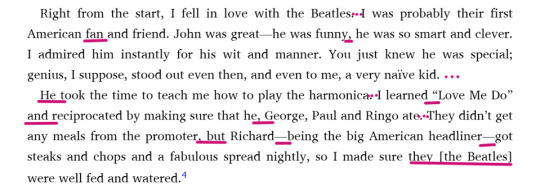
In Memories of John Lennon (p.219-220):
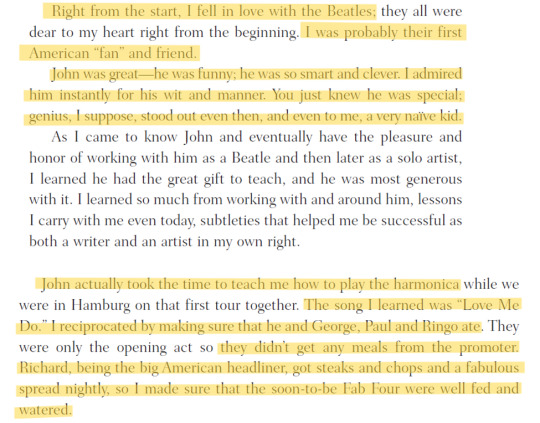
This quote is altered extensively, though the meaning is more or less preserved. I’ve highlighted in yellow the parts Lewisohn quotes, and marked in red any additional changes Lewisohn made to the quotes text. There are several omissions – one a full paragraph long – that are unmarked.
The only marked change is the bracketed “[the Beatles]”, and even this isn’t done correctly. Lewisohn writes, “I made sure they [the Beatles] were well fed and watered,” indicating that “they” is the term used in the orginal source. Not so. Preston’s original piece reads, “I made sure that the soon-to-be Fab Four were well fed and watered.” There’s no “they” in the quote – Lewisohn introduces ambiguity with his own rephrasing, and then adds a bracketed “correction” as if it’s Preston’s words that lack clarity.
It’s particularly galling to me that Lewisohn found the need to extensively rephrase Billy Preston’s own recollections of a departed friend. Preston’s memories about John don’t meet whatever benchmark Lewisohn uses, so he alters them – Lewisohn never knew John Lennon himself, but he’s the authority on how his friends and colleagues should remember him.
Sources:
Lewisohn M. 2013. The Beatles: All These Years Vol. 1: Tune In. New York (NY): Crown Archetype. [ebook]
Ono Y [editor]. 2005. Memories of John Lennon. HarperCollins Publishers, Inc. [ebook]
22 notes
·
View notes
Text
Two companies, One union, and their union.
The Company and the Union was written by Pulitzer prize winning journalist William Serrin and published in 1974. In the text, Serrin tells the story of the United Auto Workers Union, General Motors, and the 1970 General Motors Strike.
The topic of Tue company and the Union is inherently rigid. The specific subject matter might give the impression that it will be a slow, dragging read, with many of the pitfalls of most academic and historical writing for general audiences. (Unless you're a freak like me who gets off to citations and peer reviewed research) Most folks find historical writing to be boring at best. Often times the prose is devoid of emotion, reading can feel monotonous, and after a few chapters it turns into a slew of information rather than a cohesive educational text.
The primary advantage of this story is it's author; Serrin's journalistic writing style lends the prose toward a story format. While the citation and research could have been better presented, ultimately what The Company and the Union does most effectively is tell its story. I've always felt that journalist write some of the best historical texts for the general public. When the journalist is allowed to form historical information and research into a narrative, we get works like the topic of this review. The Company and the Union is special because it tells the story of UAW, GM, and allows the reader to feel every emotion that comes along with the history it presents.
The text is well sourced, and features some of the most well sourced data about General Motors and Ford work settings prior to 1970. While Serrin could cite his sources more consistently, the sources he does cite are always poignant, and when researched, provide comprehensive data about the topic at hand. My personal favorite aspect of the text are the quotes. Being able to engage with the feelings and the thoughts of the players involved, from the common plant worker, to executives, to even CEOs and Union leaders make the story not only feel dynamic, but humanizes the whole experience. Reading a housewife complain about how she might need two incomes to support a family with children feels privileged in 1970. In 2025 its hilarious.
My most scathing critique of the text is that, unfortunately, it's author is an old white guy. The lack of analysis and critical though rears its head when in chapter four Serrin insinuates that the rise in crime correlates with the rising number of black workers following the 1950s. There is little to no discussion of any gender identity other than men in the workplace, and the one section I can recollect where Serrin touches on the topic is as a side note, remarking that women tend to have jobs in sewing or secretarial work without further explanation.
The greatest triumph for the story is the way it highlights the neo-liberal reality of UAW. In 2024, the UAW in one breath, threatened corporate America with a general strike in 2028, while then immediately immediately kissing the ring of Kamala Harris. In 2025 UAW president Shawn Fain has praised Donald Trump repeatedly for his tariffs. Despite bathing in, and providing the public with an aesthetic of radical politics, and pretending that they are in any way anti-capitalist, what these endorsements communicate is an alignment with power. That alignment has always been at the heart of the UAW since its inception, which Serrin expertly indulges in the second and third chapters. When we engage with the history of the UAW as a union, it exists as a neo-liberal check on General Motors that provides the illusion of "keeping them honest" while in reality, they just allow for a steady management of the exponential growth that General Motors strives for. The closer you are to "American" standards of humanity, the more you reap the benefits of the union.
While I wouldn't use the the text as an educational resource, for the lay person looking for an engaging, emotionally gripping, story of one of the largest corporations the world has ever seen, and the union that it co-opted, this text is a phenomenal start for learning.
0 notes
Video
tumblr
Atli se’raxatili tsáyuuni. Dax gaxatli a’tš’íali. yunsatsáxe qaxtats’i, rajax, enenhera gatats’i. Átsayúúni iyár at’gagawigae. Hek’eq. The people came her many years ago. They had nothing and they thrived. They built cities, universities, they built an empire. Tonight those many years become a story. They never happened.
#conlang#constructed language#saande#sanne#atšii#translation#I have no recollection of the source for the quote though because I no write it down#it was a facebook memory from like 10 years ago#sorry#my voice#video
19 notes
·
View notes
Text
July Colorful Column: Remus is a Crip, and We Can Write Him Better.
There is one thing that can get me to close a fic so voraciously I don’t even make sure I’m not closing other essential tabs in the process. It doesn’t matter how much I’m loving the fic, how well written I think it is, or how desperately I want to know how it ends. Once I read this sentence, I am done.
It’s written in a variety of different ways, but it always goes something like this: “You don’t want me,” Remus said, “I am too sick/broken/poor/old/[insert chosen self-demeaning adjective here].”
You’re familiar with the trope. The trope is canonical. And if you’ve been around the wolfstar fandom for longer than a few minutes, you’ve read the trope. Maybe you love the trope! Maybe you’ve written the trope! Maybe you’re about to stop reading this column, because the trope rings true to you and you feel a little attacked!
Now, let’s get one thing out of the way right now: I am not saying the trope is wrong. I am not saying it’s bad. I am not saying we should stop writing it. We all have things we don’t like to see in our chosen fics. Maybe you can’t stand Leather Jacket Motorbike Sirius? Maybe you think Elbow Patch Remus is overdone? Or maybe your pet peeves are based in something a little deeper - maybe you think Poor Latino Remus is an irresponsible depiction, or that PWPs are too reductive? Whatever it is, we all have our things.
Let me tell you about my thing. When I first became very ill several years ago, there were various low points in which I felt I had become inherently unlovable. This is, more or less, a normal reaction. When your body stops doing things it used to be able to do - or starts doing things you were quite alright without, thank you very much - it changes the way you relate to your body. You don’t want to hear my whole disability history, so yada yada yada, most people eventually come to accept their limitations. It’s a very painful existence, one in which you constantly tell yourself your disability has transformed you into a burdensome, unworthy member of society, and if nothing else, it’s not terribly sustainable. Being disabled takes grit! It takes power! It takes a truly absurd amount of medical self-advocacy! Hating yourself? Thinking yourself unworthy of love? No one has time for that.
Of course, I’m being hyperbolic. Plenty of disabled people struggle with these feelings many years into their disabilities, and never really get over them. But here’s the thing. We experience those stories ALL THE TIME. Remember Rain Man? Or Million Dollar Baby? Or that one with the actress from Game of Thrones and that British actor who seemed like he was going to have a promising career but then didn't? Those are all stories about sad, bitter disabled people and their sad, bitter lives, two out of three of which end in the character completing suicide because they simply couldn’t imagine having to live as a disabled person. (I mean, come on media, I get that we're less likely to enjoy a leisurely Saturday hike, but our parking is SUBLIME.) When was the last time you engaged with media that depicted a happy disabled person? A complex disabled person? A disabled person who has sex? No really, these aren’t hypothetical questions, can you please drop a rec in the notes?? Because I am desperate.
There are lots of problems with this trope, and they’ve been discussed ad nauseam by people with PhDs. I’m not actually interested in talking about how this trope leads to a more prevalent societal idea that disabled people are unworthy of love, or contributes to the kind of political thought processes that keep disabled people purposefully disenfranchised. I’m just a bitch on Tumblr, and I have a bone to pick: the thing I really hate about the trope? It’s boring. I’m bored. You know how, like, halfway through Grey’s Anatomy you realized they were just recycling the same plot points over and over again and there was just no WAY anyone working at a hospital prone to THAT MANY disasters would stay on staff? It's like that. I love a recycled trope as much as the next person (There Was Only One Bed, anyone?). But I need. Something. Else.
Remus is disabled. BOLD claim. WILD speculation. Except, not really. You simply - no matter how you flip it, slice it, puree it, or deconstruct it - cannot tell me Remus Lupin is not disabled. Most of us, by this point, are probably familiar with the way that One Canonical Author intended One Dashing Werewolf to be “a metaphor for those illnesses that carry stigma, like HIV and AIDS” [I’m sorry to link you to an outside source quoting She Who Must Not Be Named, but we’re professionals here]. Which is... a thing. It’s been discussed. And, listen, there’s no denying that this parallel is a problematic interpretation of people who have HIV/AIDS and all such similar “those illnesses” (though I’ll admit that I, too, am perennially apt to turn into a raging beast liable to harm anything that crosses my path, but that’s more linked to the at-least-once-monthly recollection that One Day At A Time got cancelled). Critiques aside, Remus Lupin is a character who - due to a condition that affects him physically, mentally, emotionally, and intellectually - is repeatedly marginalized, oppressed, denied political and social power, and ostracized due to unfounded fear that he is infectious to others. Does that sound familiar?
We’re not going to argue about whether or not “Remus is canonically disabled as fuck” is a fair reading. And the reason we’re not going to argue about whether or not it’s a fair reading is because I haven’t read canon in 10-plus years and you will win the argument. Canon is only marginally relevant here. The icon of this blog is brown, curly haired Remus Lupin kissing his trans boyfriend, Sirius Black. We are obviously not too terribly invested in canon. The wolfstar fandom is now a community with over 25,000 AO3 fics, entire careers launched from drawing or writing or cosplaying this non-canonical pairing. We love to play around here with storylines and universes and races and genders and sexualities and all kinds of things, but most of the time? Remus is still disabled. He’s disabled as a werewolf in canon-compliant works, he’s disabled in the AUs where he was injured or abused or kidnapped or harmed as a child, he’s disabled in the stories that read him as chronically ill or bipolar or traumatized or blind or Deaf. I’d go so far as to say that he is one of very few characters in the Wide Wonderful World of media who is, in as close to his essence as one can be, always disabled. And that means? Don’t shoot the messenger... but we could stand to be a tiny bit more responsible with how we portray him.
Disabled people are complicated. As much as I’d like to pretend we are always level-headed, confident, and ready to assert our inherent worth, we are still just humans. We have bad days. We doubt our worth. We sometimes go out with guys who complain about our steroid-induced weight gain (it was a long time ago, Tumblr, okay??). But, we also have joy and fun and good days and sex and happiness and families and so many other things.
Remus is a disabled character, and as such, it’s only fair that he’d have those unworthy moments. But - I propose - Remus is also a crip. What is a crip? A crip - like a queer - is someone who eschews the limited boundaries placed on their bodies, who rejects a hierarchy of oppression in favor of an intersectional analysis of lived experience, who isn’t interested in being the tragic figure responsible for helping people with dominant identities realize how good they have it. Crips interpret their disabilities however they want, rethinking bodies and medicine and pleasure and pain and even time itself. Crips are political, community-minded, and in search of liberation.
Remus is a character who struggles with his disability, sure. But he’s also a character who leverages his physical condition to attempt to shift communities towards his political leanings, advocates for the rights of those who share his physical condition, and has super hot sex with his wrongfully convicted boyfriend ultimately goes on to build community and family. Having a condition that quite literally cripples you, over which you have no control, and through which you are often read as a social pariah? That’s disability. But using said condition as a means through which to build advocacy and community? Now that’s some crip shit.
Personally, I love disabled!Remus Lupin. But I love crip!Remus Lupin even more. I’d love to see more of a Remus who owns his disability, who covets what makes him unique, and who never ever again tells a potential romantic partner they are too good for him because of his disability. This trope - unlike There Was Only One Bed! - sometimes actually hurts to read. Where’s Remus who thinks a potential romantic partner isn’t good enough for him? Where’s Remus who insists his partners learn more about his condition in order to treat him properly? Where’s sexy wheelchair user Remus? Where’s Remus who uses his werewolf transformations as an excuse to travel the world? Where’s crip Remus??
We don’t have to put “you don’t want me” Remus entirely to bed. It is but one of many repeated tropes that are - in the words of The Hot Priest from Fleabag - morally a bit dubious. And let’s face it - we don’t always come to fandom for its moral superiority (as much as we sometimes like to think we do).
This is not a condemnation - it is an invitation. Able-bodied folks are all but an injury, illness, or couple decades away from being disabled. And when you get here, I sincerely hope you don’t waste your time on “you don’t want me”ing back and forth with the people you love. I’m inviting you to come to the crip side now. We have snacks, and without all the “you don’t want me” talk, we get to the juicy parts much faster.
Colorfully,
Mod Theo
#wolfstar#disability in fandom#disabled remus#crip remus#please write me some crip remus#I beg of you#fandom meta
114 notes
·
View notes
Text
Nathan Hale’s Death vs the Primary Sources
(aka did William Hull actually know anything?)
“The first the Americans heard of Hale’s death was on the evening of the twenty-second [September 1776], when Captain John Montresor…an aide de camp to General Howe, approached an outpost…under flag of truce. His main business…did not concern Hale, but was to transport to Washington a letter from Howe offering an exchange of high-ranking prisoners. Joseph Reed, accompanied by General Israel Putnam and Captain Alexander Hamilton, rode to meet him. After passing over the letter, he casually added that one Nathan Hale, a Captain, had been executed that morning.”
This passage comes from “Washington’s Spies: The Story of America’s First Spy Ring” by Alexander Rose and it, along with the wonderful @queerrevolution1776 inspired me to go on a (brief) primary source deep dive of Hale’s death. A challenge, given the lack of primary sources surrounding Hale’s spy work, and the tall tales that grew up around it.
I started here: Why was Hamilton there? He was not an aide-de-camp at this point, why would he be present? And that question, my friends, led to a whole host of others!
(Info under the cut because there is a lot, and it’s fascinating :))
The (Un)reliability of Recollection
The idea of Hamilton having been present to hear of Hale’s fate, so far as I can see, is first related in “Revolutionary Services and Civil Life of General William Hull”, a biography based on Hull’s unpublished memoirs, and written by his daughter, Maria Hull Campbell:
“In a few days, an Officer came to our camp, under a flag of truce, and informed Hamilton, then a Captain of the Artillery, but afterwards an aide to General Washington, that Captain Hale had been arrested within the British lines, condemned as a Spy, and executed that morning. I learned the melancholy particulars from this officer, who was present at his execution, and seemed touched by the circumstances attending it.”
William Hull was a friend of Hale’s from Yale, and they were both in the 19th Regiment, before Hale transferred to Knowlton’s Rangers. A lot of what we know of Hale’s death seems to come from Hull’s memoirs, right down to his (possibly incorrect and/or exaggerated) final words: “I only regret, that I have but one life to lose for my country.” Hull was a close friend of Hale’s, so it does make some sense that he’d know something of it. However, the above biography was written in 1848, and related conversations that had taken place a long time earlier. Campbell herself admits she includes conversations not even present in her father’s memoirs.
Though her book is not the only 18th/19th century one about Hale’s death, it quickly became clear that all of them were based on conversations with Hull. The first time the name ‘Nathan Hale’ even entered the public conscious properly after the war was in 1799, in Hannah Adams’ “A Summary History of New England and General Sketch of the American War” where she writes: “The compiler of this History of New England is indebted to Gen. Hull of Newton for this interesting account of Captain Hale.”
Hale isn’t mentioned again until 1824, in a book by Jedediah Morse, who says he got his info from Adams, who in turn got it from Hull. It seems likely, then, that the idea of Hamilton being there (and indeed, that most of what we know) came from Hull’s supposed recollection, 20+ years after the event took place.
Now, this is not to say that Hull was lying. Return records show that he and his Regiment were certainly present at “Camp near to Harlem Heights” with Washington’s forces at the time that Washington would have been given the information about Hale, and we know Hamilton and his Artillery were present also, as it is at Harlem Heights that he apparently first came to Washington’s notice (according to John C. Hamilton). It did seem a bit strange though, to both me and @queerrevolution1776 , for Hull or Hamilton to have met with an official flag of truce, when they were both only Captains, and not on Washington’s staff (he’d only just become aware of Hamilton’s existence, after all).
Washington makes no mention of either of them in his correspondence, instead writing to Jonathan Trumbull Sr. that it was Colonel Joseph Reed whom Howe’s aide, John Montresor, met with. It makes sense that Reed would have met with Montresor, given his position on Washington’s staff. Reed is mentioned in Rose’s book, but not Hull’s account, and I thought that was a discrepancy worth a look. Hull, writing after the fact, mentions only Hamilton, who by then was a well-known, and scandalous, public figure. Reed, on the other hand, was nowhere near as popular, and perhaps did not serve as such an interesting figure in a story about Hull’s friend, one of America’s earliest spies.
Sure, Hamilton could have been nearby, or overheard the discussion, and in turn told Hull what he had heard—which could explain why Hale’s last moments have been exaggerated, or perhaps accidentally falsified, given that a British officer who was present apparently heard: “It the duty of every good officer, to obey any orders given him by his commander in chief” and not what is so often recounted. Even a newspaper (The Essex Journal) publishing an account five months later, quoted Hale as having said: “If I had ten thousand lives I would lay them all down, if called to it, in defence of my injured, bleeding country”—No one seems quite able to agree exactly what he said! Hull may well have also told his children he was there to make the story seem more personal, and exciting.
(And I’m really starting to doubt that Hamilton was at the meeting at all. It’s never mentioned in any of his writing, or in the John C Hamilton biography)
There’s no “official” reports of Hale’s death either (excepting the noting of his death on the 22nd September casualty list) which is why so much has relied heavily on what Hull claimed to have been told. When Washington wrote Trumbull about the flag of truce meeting the next day, he was mostly concerned with the fire that had engulfed New York the day before, and the claims that Continental soldiers and spies had set it. The only possible reference we have from him that concerned the meeting between Reed and Montresor, with perhaps an oblique reference to Hale, is as follows:
“On Friday night about eleven or twelve o’Clock a fire broke out in the City of New York, which burning rapidly till after Sunrise next morning, destroyed a great number of Houses—By what means it happened we do not know; but the Gentleman who brought the letter out last night from General Howe, and who was one of his Aid De Camps informed Colo. Reed that several of our Countrymen had been punished with various deaths on account of it. Some by hanging, others by burning & c. alledging that they were apprehended when committing the fact.”
Howe himself never mentioned Hale explicitly in official correspondence between him and Washington, and Washington never did either. In fact, neither of them mentioned the spies or the fire to one another at all, concerned with prisoner exchanges, and the accusation of ill-treatment of British prisoners (Howe to Washington 21st September 1776 and Washington to Howe 23rd September 1776). Hale, and his fate, was unfortunately left to Montresor’s verbal account, and Hull’s dubious reporting.
Tench Tilghman on Hale’s Death
In terms of other primary correspondence that might reference Hale’s death, even remotely, we have accounts from Washington’s aide-de-camp, Tench Tilghman.
Firstly, Tilghman wrote his father, James Tilghman, on the 25th September 1776, of the events and executions surrounding the fire. He was sent to deliver Washington’s reply to Howe’s camp under another flag of truce the day after Montresor’s, and spoke with some men in Howe’s camp then:
“Reports concerning the setting fire to New York: If it was done designedly, it was without the knowledge or Approbation of any commanding officer in this Army…every man belonging to the Army who remained in or were found near the City were made close prisoners. Many Acts of barbarous cruelty were committed upon poor creatures who were perhaps flying from the flames, the Soldiers and Sailors looked upon all who were not in the military line as guilty, and burnt and cut to pieces many. But this I am sure was not by Order. Some were executed next day upon good Grounds… I went down to the Enemy's lines yesterday with a Flag to settle the Exchange of prisoners…I met a very civil Gentleman with whom I had an Hours conversation…”
In Rose’s book, he mentions Hull & Colonel Samuel B. Webb going with Tilghman to the camp to further question Montresor about Hale. Webb, another aide-de-camp to Washington, may well have gone. But it seems a bit strange for Hull to have done so. And Hull’s account did not mention Webb, or Tilghman, which is also a bit odd. Rose made no note of his source for this, but I’d like to find it! Perhaps it’s mentioned in Webb’s journals, something I’d have to travel to Yale to see :(
Tilghman did, eventually, mention Hale explicitly, though not by name, when he wrote to Egbert Benson on 3rd October 1776:
“I am sorry that your Convention do not think themselves legally authorized to make examples of those villains they have apprehended…The General is determined if he can bring some of them in his hand’s under the denomination of spies, to execute them. General Howe hanged a Captain of ours belonging to Knowlton' s Rangers, who went into New-York to make discoveries. I don’t see why we should not make retaliation.”
So he definitely knew of Hale’s death by then, and it seemed to anger him greatly.
Miscellaneous Reports of Hale’s Death
There were also reports made by various others, that mention explicitly, or might imply, Hale’s death:
“Friday last we discovered a vast cloud of smoke arising from the north part of the city, which continued '‘ill Saturday evening…those that were found on or near the spot were pitched into the conflagration, some hanged by their heals, others by their necks with their throats cut. Inhuman barbarity! One Hale in New York, on suspicion of being a spy, was taken up and dragged without ceremony to the execution post and hung up.” (A Letter from September 28th 1776)
“We hanged up a rebel spy the other day, and some soldiers got, out of a rebel Gentleman’s garden, a painted soldier on a board, and hung it along with the Rebel; and wrote upon it, General Washington, and I saw it yesterday beyond headquarters by the roadside.” (Kentish Gazette, November 1776)
“A spy from the enemy (by his own full confession) apprehended last night, was this day executed at 11 o’clock in front of Artillery Park.” (General Howe’s diary)
“The Enemy charged some stragglers of our people that happened to be in New York with having set the City on Fire designedly and took that occasion as we were told to exercise some inhuman Crueltys on those poor Wretches that were in their power.” (Committee of Secret Correspondence to Silas Deane 1st October 1776)
What does all this mean?
Hamilton probably wasn’t there (but I can’t make a call on that for sure!)
basically, it’s clear that the primary sources on Hale’s death are few, and somewhat contradictory in places. I found it super interesting, and thought y’all might too! Please keep in mind I’m not calling William Hull a liar (and I definitely haven’t done anywhere near enough research to say anything conclusively!)
But I definitely think it’s always worth examining what we think we know from primary sources. And it’s very fun!
#this took me literal days to collate so I hope y’all find it as interesting as I did#should’ve been doing uni work but no regrets#we all know history research makes me ridiculously happy#nathan hale#William Hull#alexander hamilton#tench tilghman#spy work#September 1776#american revolution#amrev#tw: death#izz gets historical#izz rambles
61 notes
·
View notes
Text
So here's the biggest issue with reading "Fighting Prophet" - the sources really aren't cited well at all.
So you have this quote of Sherman where he's describing his grandmother:
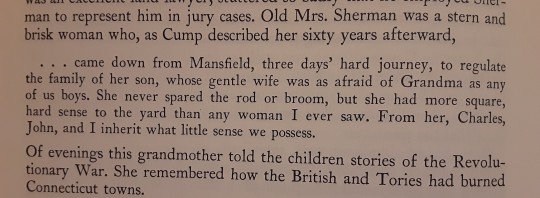
And in the back of the book all you really get is a list of sources for each chapter, and before that a big paragraph describing how all letters came from the letter collections in the Library of Congress

So I at first assumed maybe it was from Sherman's memoirs or John's recollections but I didn't find it in either. Then I googled a line from it and after searching through a few books I found it's actually from a letter Sherman wrote to a friend who had offered him condolences after Ellen had died. And it's a lengthy letter going into his family history.
I'm gonna paste it under here, because I actually really like it, especially when he starts writing about his mother:
Found in "The Americanization of Edward Bok: The Autobiography of a Dutch Boy Fifty Years After" on Gutenberg:
When Mrs. Sherman passed away, Doctor T. DeWitt Talmage wrote General Sherman a note of condolence, and what is perhaps one of the fullest expositions of his religious faith to which he ever gave expression came from him in a most remarkable letter, which Doctor Talmage gave to Bok.
"New York, December 12, 1886.
"My Dear Friend:
"Your most tender epistle from Mansfield, Ohio, of December 9 brought here last night by your son awakens in my brain a flood of memories. Mrs. Sherman was by nature and inheritance an Irish Catholic. Her grandfather, Hugh Boyle, was a highly educated classical scholar, whom I remember well,—married the half sister of the mother of James G. Blaine at Brownsville, Pa., settled in our native town Lancaster, Fairfield County, Ohio, and became the Clerk of the County Court. He had two daughters, Maria and Susan. Maria became the wife of Thomas Ewing, about 1819, and was the mother of my wife, Ellen Boyle Ewing. She was so staunch to what she believed the true Faith that I am sure that though she loved her children better than herself, she would have seen them die with less pang, than to depart from the "Faith." Mr. Ewing was a great big man, an intellectual giant, and looked down on religion as something domestic, something consoling which ought to be encouraged; and to him it made little difference whether the religion was Methodist, Presbyterian, Baptist, or Catholic, provided the acts were 'half as good' as their professions.
"In 1829 my father, a Judge of the Supreme Court of Ohio, died at Lebanon away from home, leaving his widow, Mary Hoyt of Norwalk, Conn. (sister to Charles and James Hoyt of Brooklyn) with a frame house in Lancaster, an income of $200 a year and eleven as hungry, rough, and uncouth children as ever existed on earth. But father had been kind, generous, manly with a big heart; and when it ceased to beat friends turned up—Our Uncle Stoddard took Charles, the oldest; W. I. married the next, Elisabeth (still living); Amelia was soon married to a merchant in Mansfield, McCorab; I, the third son, was adopted by Thomas Ewing, a neighbor, and John fell to his namesake in Mt. Vernon, a merchant.
"Surely 'Man proposes and God disposes.' I could fill a hundred pages, but will not bore you. A half century has passed and you, a Protestant minister, write me a kind, affectionate letter about my Catholic wife from Mansfield, one of my family homes, where my mother, Mary Hoyt, died, and where our Grandmother, Betsey Stoddard, lies buried. Oh, what a flood of memories come up at the name of Betsey Stoddard,—daughter of the Revd. Mr. Stoddard, who preached three times every Sunday, and as often in between as he could cajole a congregation at ancient Woodbury, Conn.,—who came down from Mansfield to Lancaster, three days' hard journey to regulate the family of her son Judge Sherman, whose gentle wife was as afraid of Grandma as any of us boys. She never spared the rod or broom, but she had more square solid sense to the yard than any woman I ever saw. From her Charles, John, and I inherit what little sense we possess.
"Lancaster, Fairfield County, was our paternal home, Mansfield that of Grandmother Stoddard and her daughter, Betsey Parker. There Charles and John settled, and when in 1846 I went to California Mother also went there, and there died in 1851.
"When a boy, once a year I had to drive my mother in an old 'dandy wagon' on her annual visit. The distance was 75 miles, further than Omaha is from San Francisco. We always took three days and stopped at every house to gossip with the woman folks, and dispense medicines and syrups to the sick, for in those days all had the chills or ague. If I could I would not awaken Grandmother Betsey Stoddard because she would be horrified at the backsliding of the servants of Christ,—but oh! how I would like to take my mother, Mary Hoyt, in a railroad car out to California, to Santa Barbara and Los Angeles, among the vineyards of grapes, the groves of oranges, lemons and pomegranates. How clearly recurs to me the memory of her exclamation when I told her I had been ordered around Cape Horn to California. Her idea was about as definite as mine or yours as to, Where is Stanley? but she saw me return with some nuggets to make her life more comfortable.
"She was a strong Presbyterian to the end, but she loved my Ellen, and the love was mutual. All my children have inherited their mother's faith, and she would have given anything if I would have simply said Amen; but it is simply impossible.
"But I am sure that you know that the God who created the minnow, and who has moulded the rose and carnation, given each its sweet fragrance, will provide for those mortal men who strive to do right in the world which he himself has stocked with birds, animals, and men;—at all events, I will trust Him with absolute confidence.
"With great respect and affection,
"Yours truly,
"W. T. Sherman."
#william tecumseh sherman#fighting prophet#this is a long post but I wanted to include the letter#elderly sherman talking about his mama is really sweet though
8 notes
·
View notes
Text
Zhang Longevity - Southern Archives
Hello I know I just wrote about this at length but like I acknowledged in that post, I hadn’t read Southern Archives. Well now I have, and I’ll make a couple of additions/speculations based on the information in that. Don’t read if you haven’t read Southern Archives. Some of this information is related to plot points.
The main takeaway from Southern Archives that’s truly unambiguous is that there is a way to destroy the Zhang longevity (quite violently it appears).
Two other ones that have ambiguity to them are related to qilin blood. It’s a bit hard to just give a conclusion so I won’t be giving one here. My take beneath the break, or just read the novel.
Again, I’m trying to make clear what’s speculation and what’s actually in there, but I think even just by pointing out ambiguity, I’m making an argument. Just read the goddamn novel, really, especially to draw your own conclusions about the qilin blood things.
There are some other takeaways from Southern Archives about Zhang clan lore but I thought I should make a followup of sorts to my previous post with new info. Also Southern Archives was a pretty good read. I enjoyed the third-person POV and the period atmosphere. Zhang Haiyan, Haixia and others are some very engaging characters. I feel I may be a little attracted to Zhang Haiqi but I also want to call her mommy, so you can say I’m in a bit of a Haiyan predicament.
Zhang longevity can be destroyed
Probably one of our biggest takeaways from Southern Archives. This was achieved here via some kind of gas. The people who became aware of this in Southern Archives are Zhang Qishan (and some of his clan?), Zhang Haiqi, Zhang Hailou, Mo Yungao.
This may give support for the Zhang Qishan died because he found a way to age normally theory.
Zhang longevity is in their “blood” (not said to be the same blood as qilin blood; might just be blood as in they’re born with it)
This one is more ambiguous. The quote I’m drawing this from is in c.55:
“That German nerve gas was not produced in Germany, and its origins are unclear. It seemed to be able to destroy the mechanisms within Zhang people’s blood. Mo Yungao mentioned in his records that he found this by chance, and only possessed a single cylinder of it.”
If you’re checking your sources and see that this translation and merebear’s edited MTL is different and want to know why, I will leave a note at the end about this.
Anyways, like I said, I feel like immediately saying that this blood refers to qilin blood is a bit of a leap. I, for one, mostly read it as like a Zhang inherited trait rather than qilin blood. I went into a bit of why I felt the qilin blood is directly linked to their longevity theory wasn’t the best in my previous post, and I did see a reblog also theorising about that but I was too tired to finish writing my response (and I didn’t want to seem like I’m trying to start shit; I really just have too much time on my hands).
If qilin blood is directly linked to longevity, then everyone who has lived for longer than usual has to have a bit of qilin blood. That would mean there’s some kind of threshold for recognising qilin blood, and below that threshold it counts for longevity, but isn’t strong enough to detect.
To confirm the theory, we need some kind of confirmation that an in-between state between full-on qilin blood and non-qilin blood exists. The blood has different degrees of strength - this is true. Wu Xie speculates that the Qiling is chosen by who has the strongest qilin blood (book 8 c.81; N.B. that in Shahai 3 a different reason for selecting our Qiling was hypothesised), and Zhang Haike talks about hearing rumours as a child that our Zhang Qiling had the strongest form of their kekkei genkai blood (ZHH 2 c.7).
However, I still think there’s a distinction between the ones who do and the ones who just don’t, and it’s not all about how strong the blood is. Going back to the Qipan Zhang sect, they wielded quite a lot of power within the clan because they “held the qilin”, which Wu Xie guesses to mean the qilin blood (book 8 c.50 p1). Don’t know if that meant only Qipan Zhang had qilin blood, or if there was just a higher occurrence and a greater strength (I’ve read a headcanon that it’s because the Qipan Zhang absorb anyone who has the blood). Also, Wu Xie says in the 2017 short of Zhang Hailou, “You’re from the branch family… like me, you have to worry about mosquitoes.” Wu Xie, by this point, is quite knowledgable about the Zhang clan so what he says is kinda? reliable. In fact, all three of the Zhang that have qilin blood are from the main family or descended from a sect of the main family (Haiqi is one of the few Hai-generation main family members, southern archives c.47; Qiling was part of the main family according to Haike; Foye is a descendant of Ruitong of Qipan Zhang and Wu Xie speculates at the end of book 8 that Foye’s father brought their entire sect out of the Northeast Zhang’s control, which makes Rishan a descendant of Qipan Zhang too). So is it only the main family that ever has proper qilin blood? If it’s a thing all Zhang have to a degree, surely sometimes it pops up in the branches too.
This is pretty much a joke but I was going to say that maybe bare min qilin blood only protects you from mosquitoes and nothing else but still counts for longevity, and I can’t even make that joke anymore…
The problem here is at what point do we stop saying the longevity has to do with qilin blood and just say the longevity runs in the family, and for some reason, Foye didn’t get it (or died for other reasons). And even if we take a step back and say, yes, longevity does come with the Zhang blood but qilin blood makes you live even longer, not enough time has passed for us to say that.
An addendum about qilin blood, not directly related to longevity: Can qilin blood be an acquired trait?
Mo Yungao believes qilin blood to be an acquired trait, because he asked Zhang Qiling about it and he said it was acquired (Archives c.55).
This is contradicted in other places, for example, by Zhang Haike in ZHH 2 c.7, where he specifically talks about qilin blood as an inherited trait. The two previously mentioned passages about Qipan Zhang and from Wu Xie duking it out with Xiao Zhang Ge also support this, though less directly.
So, why did Zhang Qiling tell Mo Yungao it’s acquired?
There are a couple of possibilities, including Zhang Qiling lying and this actually being true and everyone else being wrong, but I think this was a misunderstanding.
Mainly because I don’t think the line is entirely without ambiguity.
He had asked this strange person if he had been born with his extraordinary abilities or if they were acquired, and the person had replied that they were acquired.
(I have another note about this line but it doesn’t matter for the ambiguity bit, so I’ll leave it at the bottom too.)
The key here is that Mo Yungao, in this omniscient narrator recollection, did not specifically ask about his blood. Mo Yungao clearly meant his blood, because a couple of lines above, Mo Yungao is saved by this person and his blood, and his later obsession is with this blood. But what he actually asked was his extraordinary abilities (plural) so maybe Zhang Qiling took it to mean combat ability rather than specifically his blood?
Again, there are other possibilities, but I prefer a simpler answer rather than a complicated one that takes more speculation to support.
Nerve gas line note:
The original contained the phrase 张家人血液中的肌理, literally “the skin texture of Zhang people’s blood”. This is because 肌理 (skin texture) was likely a typo of 机理 (which I translate as mechanisms here; not necessarily the best one. Could also use principles but I felt that sounded less physiological and more philosophical). These two words have the exact same pronunciation. XL makes these mistakes quite a lot, and because most of our stuff is sourced from his serialisation and web versions, these mistakes don’t get corrected. I suspect this is why merebear uses the vague sentence “but it seemed to specifically target the Zhang’s family blood” instead. It’s not a huge difference, but I thought I should explain my addition of mechanisms and using destroy instead of target (this I don’t quite understand, the original says destroy and I don’t see an issue with simply using destroy) so it doesn’t seem like I’m making stuff up.
Acquired abilities line note:
“Extraordinary abilities” is actually my guess of what XL means when he wrote 无常的能力, because I feel the adjective used is a misuse of the word. 无常 can mean changeable, can be a reference to a Buddhist concept of the cycle of life and death (don’t have the best grasp on this, but bear with me), can be a euphemism for death, or can be a kind of ghost? spirit? that collects people’s souls, kind of like the Grim Reaper I guess but they work for the king of hell. None of these quite fit here. The two characters, taken on their own can maybe mean something like extraordinary, so I’m thinking maybe that’s what XL’s trying to get at but used a slightly different word to replace what you might usually use for extraordinary (不凡 or smth idk), but not to great effect.
15 notes
·
View notes
Text
Nampō Roku, Book 7 (2a): Rikyū’s Fears About the State of Chanoyu in the Centuries After His Death (Part 1).

2) Because all things [in chanoyu] are determined by the yin and yang kane of the daisu -- from the multitudinous arrangements¹ to the [chanoyu practiced in] the straw-thatched wabi room² -- it is not possible for these laws to manifest themselves in [ones] doings before [one] has undergoing many years of [dedicated] training.
_________________________
◎ As has been remarked upon by virtually every commentator over the years, at least parts of this passage (and, probably the entire discourse) are likely spurious -- not least of all because it alludes to the state of chanoyu “one hundred years” after Rikyū’s death (which was the precise time when Tachibana Jitsuzan brought the Nampō Roku to the attention to the select group of his contemporaries who were gathered, to study such things, in the Enkaku-ji in Hakata*). Nevertheless, the passage is so moving -- to us -- because it eloquently describes the sort of chanoyu with which we are familiar, the chanoyu created by the modern schools based on Sōtan’s model, which is still practiced by us today. That said, since Book Seven is supposed to represent Nambō Sōkei’s final pensée, his recollections of Rikyū and his chanoyu, written down in the several hours between the conclusion of the dawn memorial service on the third anniversary of Rikyū’s seppuku, and Sōkei’s departure for the mountains (where he intended to make an end of himself), it would be odd for Sōkei to quote such a long speech, especially without any sort of preamble or other qualification†, at a point where time would have been of the essence‡. This alone suggests that the text is spurious (at least in so far as its presence in this particular book is concerned).
By Jitsuzan's day, Sōtan’s chanoyu had been the universally accepted standard for so long that even those people who were preserving Rikyū’s densho (and so, presumably, were guided by them) found it impossible to distance themselves from it -- so that even Rikyū’s writings and the surviving teachings of Jōō were being interpreted through the practices of Sōtan.
Thus, while this well-known passage (it could be easily argued that it is the best known section of the entire Nampō Roku**) is moving, and not to be disparaged or written off entirely, we must still keep in mind that it contradicts the essence of the gokushin-no-chanoyu that Rikyū practiced, and from within which Rikyū’s teachings were born.
This entry is, by far, the longest in the entire Nampō Roku, and most commentators deal with it as a single unit. Tanaka Senshō, however, has divided it into much more manageable units, and I will follow his approach here -- since doing otherwise would really be impossible on a blogging site like Tumblr. __________ *Now the central ward in Fukuoka City. Hakata was an independent (Korean) city-state until it was forcibly incorporated into the Japanese nation in 1595 (in the aftermath of the failure of the first invasion of the continent, in 1592).
†Such as “I remeber Rikyū used to say....” (This kind of device is, indeed, found in authentic expository passages elsewhere in the Nampō Roku, where Sōkei is quoting Rikyū.)
This book should contain only Sōkei’s reminiscences, not material brought in from other sources. That is what Sōkei's designation oboegaki [覺書] means. It is not a collection of random pieces of paper that were brought together for preservation (the way several of the earlier books were) -- though, of course, Sōkei’s intent has been largely superseded by Tachibana Jitsuzan’s desire to include all of the remaining documents from Sōkei’s wooden chest, so that none would be left out (which could have prompted someone else to prepare a collection that would compete with the Nampō Roku for the title of the ultimate repository of Rikyū‘s teachings).
‡The convention was that this sort of suicide, called oibara [追腹], was supposed to take place on the day of the third anniversary of the death of ones master.
**Tanaka Senshō states that every practitioner of chanoyu (in Japan) is surely familiar with the ideas expressed in the statement under consideration in this post -- and, probably with the remainder of the passage as well.
¹Hyaku-sen-man no kazari [百千萬ノ飾].
Literally, “the hundred, the thousand, the ten-thousand arrangements....”
The kanji should not be taken literally (they are not supposed to be combined into a single, specific number); they are intended to suggest a number that is completely beyond what the human mind can imagine or comprehend*.
While, at least in so far as Rikyū would have been concerned, this is certainly an exaggeration, it does describe the state of chanoyu at the end of the seventeenth century (which was after the daimyō had succeeded in having their different ways of performing chanoyu officially recognized by the Tokugawa bakufu) -- and, of course, chanoyu as it exists today. __________ *Man [萬], which means ten-thousand, was, of course, the largest number that had any sort of practical meaning, in so far as it could -- as a concept -- be grasped by the human mind. Nevertheless, even here, ten-thousand objects is, in fact, difficult to imagine.
²Kusa-buki no wabi zashiki [草茨ノワヒ座鋪].
The first compound seems to be miscopied. From context, it would appear that the intended word should be kusa-buki [草葺き], which means straw thatching, a straw-thatched (hut)*.
The second compound, zashiki [座鋪] is, likewise, nonstandard (at least in so far as Rikyū’s own writings are concerned)†.
While this idea -- of a straw-thatched hut as the prototypical wabi tea-hut -- certainly seems completely authentic to us, Rikyū, himself, appears to have disliked the heavy effect of this kind of roof (which he considered stifling and oppressive‡); he preferred bark shingles, which gave the roof a light quality. Furuta Sōshitsu was the first to employ a thatched roof (which he “borrowed” from the simple peasant-farmer houses found in mountain villages), and Oribe’s preferences were imitated by the machi-shū. Indeed, the thatched roof became a hallmark of Sōtan’s style of chashitsu. __________ *The kanji ibara [茨] actually means plants with thorns. Such plants were occasionally used as living fences (though rarely in plantings associated with chanoyu), but not for roofing material. Rice straw was used to create a waterproof thatching.
†The word is more usually written zashiki [座敷]. That said, zashiki [座鋪] is seen in some of the early Edo period machi-shū writings on chanoyu.
‡Rikyū seems to have felt that this kind of roof looked extremely heavy (a true thatched roof, such as seen in mountain villages, could be several shaku thick). And, given the fact that the building itself was supposed to be constructed of very basic materials (such as wooden pillars no thicker than literally necessary), he felt that the heavy roof would seem capable of crushing the participants were the walls to give way. Again, this illustrates his sensitivity to visual cues.
2 notes
·
View notes
Text
“They Won’t Let You Remember”: Obsession Before Fandom
[This is another round of extremely personal spelunking into my own fannish past that I sometimes do on this and other platforms, including Dreamwidth, which is where I first posted it. Content warning for digressions into Fannish Discourse, and also brains - mostly mine - conflating fiction and reality in sometimes unhealthy ways.]
Not long ago, my mom asked me on the phone if I was aware that a new Men in Black movie would be out later this year. I told her that I knew, and added, “If I see it with other humans, they might have to hear how the original was one of the root causes of my mind control feelings.” Not the root cause, I should emphasize: those feelings could have come from any number of sources, but that number is probably greater than “one.” We both knew why she had brought up this particular franchise. There is a file cabinet in my childhood bedroom that once contained many, many handwritten stories – some co-written with middle school classmates, though most of them weren’t – that featured the titular secret organization, the protectors of the Earth from the scum of the universe, as the bad guys. I wrote those in order to deal with the sharp turn that my already present Mind Control Feelings took when a silly science fiction comedy featuring giant space bugs encouraged me to root for characters who maintained the status quo by erasing memories from ordinary people – people like me – on a regular basis. Some of you might be asking, “Wait, you knew it was only a movie, right?” And my answer would be, “Yes, but…” Since time and emotional distance have both clarified and obscured my understanding of how I used to think and behave, here is the best (and probably most long-winded) way that I can answer that question for both myself and others: I was an imaginative and overwhelmingly anxious child. On the one hand, my imaginative side desperately wanted magic and aliens and Weird Stuff to be real, which I still don’t think was always a bad thing. On the other hand, during my preteen and teenage years, my anxiety (which wouldn’t be linked to a diagnosis until much later in my life) manifested as “what if?” scenarios that were at least as convincing as reality… even if they were based in speculative fiction. Even if I didn’t believe that they would happen, I spent a lot of time telling myself stories about what might happen if they did, or even just thinking, “What if this is how the world is supposed to work, even if I don’t like it or want it and you can’t make me?” So, although I knew the difference between fiction and reality by the age of twelve, knew that Men in Black was Only A Movie, my “what if?” reflex kicked in hard the more I recognized its world as being much closer enough to my own than my previous, limited encounters with memory erasure in fiction. According to the rules of that world, if the Weird Stuff were real, I wouldn’t even know, and, according to the text, shouldn’t know. “Wasn’t the next line of the theme song ‘They won’t let you remember’?” Older Sister asked, the last time we talked about it. Yes. Yes, it was. The immediacy is right there in the song’s refrain (which, by the way, is still an earworm and a half). At one point, Tommy Lee Jones’ veteran agent character insists that, while Earth is constantly under extraterrestrial threat, humans can only live our lives peacefully if we don’t know about it. (Keeping in mind that humans do a pretty solid job of threatening life on Earth ourselves, I feel like that statement is also linked to questions about the supposedly blissful ignorance of privilege, which go beyond the scope of this post, but are still worth mentioning.) Maybe I reacted so strongly to that bit of dialogue because I believed that it wasn’t true, or because I feared that it was. I’m pretty sure that it was the combination of that scene and its message, with my recurring issues around authority and self-control, and my growing self-awareness about my misbehaving brain, that set my anxious imagination spinning. I would guess that I was wondering something like, “What if the only way that I could have peace of mind was if somebody or something else edited my thoughts and memories without my knowledge or consent?” That idea scared me. It made me angry. And since I was not mature enough to have any filters or sense of other people’s boundaries, I talked – loudly and incoherently – to anybody who would listen, and quite a few people who wouldn’t, about how scared and angry it made me. A lot of the things that I said and did are now difficult for me to understand (one might almost say… alien), and I’m not sure whether they helped with my worries or just made them worse. I do know that this was neither the first nor the last work of fiction about which some of my loved ones told me to shut up because I was too obsessed, resulting in screaming fights, sneering mockery, and tears. I was also old enough, you see, to understand that I wasn’t responding to fiction in the same way that a lot of my peers were, and to, perhaps, start feeling like there was something wrong with me. Not that this was enough to shut me, in fact, up. But I did something else, too: I started to write the stories that I mentioned above. Some of my point-of-view characters were disillusioned agents, others were characters from other media that I enjoyed; the more sources I could pull from, and the more surreal I could make the mix, the happier I was. Still other POV characters were authorial avatars who started out as innocent bystanders and narrowly escaped having their memories wiped. (A few of those self-insert fantasies also involved my earliest fictional crush, who just happened to be an alien from a certain book series that I loved at the time. I quite happily imagined scenarios in which my very knowledge of his true nature was forbidden and yet our love conquered all in the end, but I never put any of those scenarios on paper. I kind of wish I had.) Some of the storylines fizzled out after a few chapters, while others ended with my protagonists riding off into the sunset with their minds, for the time being, safe. I should stress that even my writing wasn't necessarily integrated into my life in a healthy way: I scribbled during my classes (yes, I got caught at least once), I wrote scenarios that crossed the line from nonsensical into offensive (why so many “man in a dress” jokes, younger self? Why even one?), and I buttonholed friends and classmates as audiences and even collaborators despite their probably being much less interested than I was. Even though I was discovering a third option besides “shut up forever” and “shut up never,” it would take several more years, at least two more obsessions, and the discovery of online fandom (I only somewhat knew what “online” was in the late 1990s, and “fandom” was nowhere near my vocabulary) before I sorted out the appropriate time and place for each of those options. But I was on my way there, even if I didn’t know what “there” was. When I questioned and pulled apart an established narrative to turn the heroes into villains and shine a light on viewpoints that I thought the original creators had overlooked, I was writing fanfiction, whether I knew it or not. When I finally did find my way to fandom communities, it was thanks to the Harry Potter books, whose world-building also relies on what TV Tropes calls “The Masquerade.” (If you look up the page for that trope, guess whose quote is right at the top? Yeah.) Which led me to recognize it in certain versions of X-Men, and The Incredibles, and Torchwood and The Vampire Diaries and and and… The more I saw of organized efforts to conceal the existence of Weird Stuff from the Oblivious Masses, the more I understood that the audience was meant to feel like we were in on the secret, but I couldn’t stop sympathizing with the people who weren’t. I still dislike and distrust that trope to this day, even in works that I otherwise enjoy, and storylines involving memory erasure – consensual or not, narratively endorsed or not – still push both good and bad buttons, sometimes both at once. And I believe that my explorations of mind control in fiction, from the beginning until now, have partly been informed by questions like, “What if I couldn’t trust my own mind, and was asked to believe that this was for my own good and/or the good of society?” And, since it bears mentioning: I hope that nobody interprets this recollection as, “A storytelling device warped Nevanna’s understanding of reality, and therefore stories can reprogram people’s behaviors and problematic fiction should be eliminated!” First of all, I object to that kind of black-and-white thinking, as a librarian, a writer, and someone who tries to thoughtfully consume media. Secondly, it’s more accurate that the dysfunction in my own brain once warped my understanding of reality; that even then, I was still responsible for my own actions; and although I have a history of giving fictional constructs an unhealthy amount of power over my own life, I grew out of it. And even though I have mixed feelings about the debate over Problematic Fiction, and I certainly do not condone harassment and shaming – because I’ve been there and done that, on both sides – I try to maintain that it is not my place to stop people from having negative emotions about stories. Even if I don’t agree, even when their objections make me uncomfortable, I can disagree with what they’re saying or doing without invalidating what they might be feeling. And I try to be better at doing so, because I am the last person in the world to deny that stories spark powerful emotions and thoughts, that sometimes they go against the creators’ intentions. Part of becoming a responsible consumer of media and participant in fandom is learning to manage those emotions constructively and make space for other people’s feelings and needs. I used to be angry at my younger self for being unable or unwilling to do that. I’m not anymore. That said, one of the differences between preteen Nevanna and thirty-something Nevanna is that nobody has to hear me talk about mind control unless they want to. (Although I’m happy that a noticeable number of people usually seem to want to.) I never saw the original Men in Black in the movie theater. I think it took me several tries (much to Younger Sister’s frustration) to sit through it on home video, and the ghost of who I was back then, as much as if not more than the actual content, has kept me from revisiting the 1997 movie in the intervening years. If I wanted to watch it again, I think that I would want (and here I'll paraphrase a fantasy series, also about aliens, that more or less avoids the Masquerade altogether) to prepare myself emotionally. I still haven’t watched the sequels or had much interest in doing so, and I never posted any fanfiction set in that universe. It has occurred to me that I might end up writing fic for the 2019 reimagining, if I see it (it wouldn’t be the first time in the recent past that I revisited fictional worlds from my childhood in new and surprising ways). But if I do write anything – and maybe even if I don’t – I will continue to feel pity and compassion and gratitude for the twelve-year-old believer in Weird Stuff who heard, “They won’t let you remember,” and responded, “What if I did anyway?”
2 notes
·
View notes
Note
✅ What does the fandom usually get right?
[Ask game]
Heit answering this one, since I’m in front lmao. So, the fun part about being an introject from [redacted] is that... basically no one makes any content for that source, let alone for the character I’m an introject of lmao. So technically there’s not much there for me to say the fandom did or didn’t get wrong.
Doesn’t mean we haven’t had a weird event happen related to headcanons existing in the fandom space, though.
(This got long so I’ll put it under a cut. Brief mention of source death and loose discussion of shipping, but nothing outright negative or explicit.)
Specifically, we had a really funny thing happen a few months ago when we decided to look through what the tumblr side of things has to say about my source. Surprisingly, there are like two people that ship my source with another character. This is not normally a difficult thing for our system in this fandom considering how dead this fandom is most days of the year. So we took like two seconds to glance over what was in the tags and saw shipping of all the damn things njksdnfjksd---
It was content though and we are absolutely the “person shaped thing feeding strange quadruped” meme when it comes to content, so we at least rolled that rock over to see what interesting bugs were hiding under it.
My cohost jokingly said “and watch, we’re going to introject him,” while everyone else in front at the time just kept repeating nonstop “[name], where is that bastard?” (/ref to a game quote).
Fucking.
Two days-ish later.
You know how it is. The beleaguered (/s) pk;m new. The new guy almost exclusively seems to take amusement and joy in holding that shipping headcanon like a dodgeball and throwing it full force into my face. (I kid, actually, he’s not that interested in annoying the hell out of me, but he did essentially show up like a container for that idea and nothing more.)
I live in hell because of the fandom /j
So it’s a little more complicated than something the fandom gets right, but it certainly influenced the shape of our system. It fits right with how I experience my source too, so even if I meme on it I can’t really complain lmao.
Since that incident though, we’ve taken to glancing over what people say about both my source and that other character, and apparently it is way more popular than I thought it would be in certain parts of the fandom to go “and these two totally have some weird chemistry going on.” That makes sense based on what the writing in the game says, though--- my source was up to some stupid villain shit, and [character b] is loyal to the point where the fandom can’t figure out if he’s dead or not after the chaos of everything that happened. That’s not hard to read into, especially when in the English translation, the way [character b] speaks about my source is in such a reverential way. He literally attacks anyone who shows a pint of betrayal towards the cause. That’s shipping bait right there, from what I know about fandom.
Because the fandom is so small though, we also look at the search results for other language groups of it, so actually seeing what people hypothesize about the sparse (and often poorly written) details that the game gives us is just fascinating in and of itself.
The ship, for example, is a lot more popular in English-speaking spheres of the fandom (which is a really large net that I can cast considering one of the Discord servers I’m in for this game has like thousands of folks in it, so I would be a poor observant not to mention that).
I haven’t come across as many people saying that there’s merit to this ship in Korean and Japanese spheres of the fandom (at least on Twitter; my searching is limited by what sites people post on and what sites are public). To my recollection I can think of one person in the Korean-speaking fandom sphere (on Twitter, again) that has at least hinted at the consideration that there is something weird going on in the source’s writing. The Japanese-speaking fandom sphere, meanwhile... Idk I don’t ever find much from that end of things lmao. They’re chilling, ig.
All that said, does this count as the fandom “getting something right?” I’m inclined to say this is one of those “yes and no” kinds of things, because while I’m not going to go into what our brain registers as my exomemories, I will say that there’s the interesting experience of knowing that external headcanons have affected the layout of my system because of my relationship to my source. Nothing distressing, I do want to stress, but really fucking hilarious in one hand imo.
However, it’s kind of led me to explore my exomemories a lot more. I think it’s a common enough fictive experience to write those down, to externalize these things in hopes they stop pestering you quite so badly. A lot of our system’s writing is about this series, and I exist both as my source and as a representative of what my source means to my system: a container, of sorts, of parts of our special interests, while also having a difficult-to-define relationship to that source.
I love this stupid fucking game so much /g
-Heit
0 notes
Text
i choose to embrace it
Everything is just coming together too neatly.
Let’s try to piece together how the human side of the boxes situation might be like.
Basically, we know that at the start of Carolia Arc Big Cimarron had (just got?) the Wind box
"In this world, four objects exist that are not to be tampered with under any circumstances," said Conrad. "The humans, and the humans of the superpower Shimaron at that, have managed to bring one of those objects under their control. The name of the box is 'the End of the Wind.' If it remains in their hands, they will open it sooner or later."
(quoting BT, c1, n5)
and was sneaking into Shinma with Wincott’s Poison to try to get control of its key. (and yes, they knew it was Con, though they [accidentally? intentionally?] cut off Con’s arm)
The Wincott’s poison they got from Flynn, offering her a deal:
“A secret messenger from Big Shimaron came with a proposition. The Wincott poison is supposed to be in the recesses of the Gilbit Estate. They wanted that terribly. Furthermore, they were in a great hurry. It is the only substance in the world that will let one control another at will. If a body is afflicted by that poison, it will become a puppet of the descendants of the Wincotts. Whether it’s alive or not. I gave them that poison. In exchange for the lives of the Calorian soldiers.”
(BT, c8, n6)
In the same chapter we hear from Hube that Small Cimarron has put their hands on another one, the Earth Box, having got it via the rotten Luis Biron (from novel 4) and ultimately from Suverera, before which the royals in Suverera tried to open it with Hube’s left eye, but failed.
Again in the same chapter Hube speaks of how the Earth Box was originally buried in Suverera’s soil, near the parts of the MA flute (from novel 3), and either because of the box or flute that part of Suverera harbored houseki of strange property (only mentioning maseki won’t do this not how normal houseki would do?), and the removal of box followed by flute made the place stop turning out these houseki.
Although the esoteric stones certainly brought them immense fortune, that was simply a byproduct. Svelera wasn’t mining for stones; they were looking for something much more terrible in the places where many esoteric stones were.
[...]
Yes, they were looking for a box.
[...]
While Svelera was digging for esoteric stones, they finally dug that up. Deep, deep within the rock formation, where only emaciated women and children can reach, in a place like a labyrinth.
And near that place, the treasure of the demons, the Demon Flute, was sealed. As soon as they discovered the box and brought it out of the esoteric stone pit, I had my acquaintance inconspicuously sneak down there and secure the Demon Flute. The power slowly leaking out of the box over hundreds of years may have slowly changed the surrounding bedrock into esoteric stone. Or, the part of the earth fighting against the power of the Demon Flute may have resulted in its quality being changed. At any rate, once the two objects were removed, for some reason esoteric stones completely stopped appearing and the Sveleran citizens lost their jobs.
(BT, c8, n6)
he also said Suverera’s king acted strange mining those houseki (as the cover of looking for the box)
At that time, the kingdom of Svelera had put much effort into the procurement of their esoteric stones for the betterment of the kingdom and many of the unemployed citizens began to work in the mines.
[....]
Anyway, it is no exaggeration that there was something abnormal with the mining of esoteric stones in Svelera. No matter how little rain fell or if the drinking water dried up, at the bare minimum they had to raise the crops for the next year’s seeds. However, the king of Svelera did not protect the farmland or the farmers and continued to do nothing but dig up esoteric stones. If he wanted to dig, he should have at least dug a well. It was as if the finances for the next year were in some way guaranteed.
(BT, c8, n6)
Skipping forward into the story, from Seisa Arc we know this about Seisakoku’s houseki via Sara:
Do you know what power this country has? Manpower and houseki in abundance
(BT, c7, n11)
there being also:
On the other hand, the pale pink ring Saralegui put on my finger has not budged at all, acting like a normal stone. Apparently it’s a precious houseki that can only be mined in Seisakoku, and yet it hasn’t reacted in the slightest.
(BT, c11, n12) though I mildly suspect this can be just a metaphor about Sara
And we know that the Fire Box has been in Seisa for
After staying in the same country for seventy years, I know a lot more about this country than the kids born here.
(BT, c3, n12, not remembering where to find other sources I turned to the timeline of Hazel)
Although to be honest we don’t know what the houseki relevant circumstance in Seisa had been like before this, but this time span is long enough to cover the whole experience with Seisakoku of Sara +Yel+ Probably Alazon.
Also Gilbert might have been able to tell.....? randomly off topic
Back to Suverera c8n6, Hube talks about how
Naturally, the king of Svelera did not know the significance of the box nor the power it had.
[...]
Since Svelera did not have the key – the left eyeball of a certain bloodline – and could not open the lid, they sold it to a large country.
even if they had the right idea of where to look for it and some idea of possibility of opening it with the left eye of whom.
So did they originally came to know about this box all by their own?
(OR: Another possibility- them selling it was not about reasons above but failure in opening it lead to practical worries about having neglected about finances.)
And did Small Cimarron find out about this Earth Box after it was put out to be sold by Suverera or did something else entirely just happen here?
Although certitude regarding this might never be achieved, but we know that in chapter 10, novel 6, Maxine was saying:
「ところで諸君、労働に従事する日々とはいえ、現在この小シマロンを始め、シマロン両国を宗主とする大陸全域が、魔族との聖戦に向けて一丸となっていることはお聞き及びだろう。その一翼を担う諸君にも、非常に関わりのある朗報がある」
But gone are your days of repetitive manual labor! No doubt the whispers have already spread to you; here and now starting with Small Cimarron, this continent with the Cimarrons as its countries’ suzerains, is coming together to wage our holy war against the mazokus. This is a much relevant and joyful news for you, who are after all going to undertake a part in this feat.
and answering Yuuri’s question about if the boxes are in fact things fairly easy to come by, Flynn was saying:
“It’s not easy.”
Flynn had a look on her face that looked like she was going to start chewing on her thumb’s fingernail.
“Numerous countries have been competing and searching for them for decades. They weren’t quickly found. But for them to fall into people’s possession one after another… I thought only Big Shimaron had a box and key.”
(BT, c10, n6)
which means something must had changed between the current situation and that of the last decades (or more innocently it can be just the miracle of perseverance but anyways I’m asking↓).
So this added to Maxine’s talk about how this new (yet-to-happen-or-be-stopped) war the humans were planning to do with mazoku was engineered by Small Cimarron,
Would this something be SARALEGUI?
Though Sara claimed he didn’t remember anything from his early years in Seisa
“But Saralegui, why didn’t you mention to me that you were born in Seisakoku? Not only that, back when we were in Shou Shimaron, didn’t you say that be it your country or yourself, this is your first time contacting Seisakoku?”
This means that throughout that long journey before, he was always lying to me.
“Yuuri, I never lied to you. That’s because all that happened when I was young, so I don’t have any recollection of it myself.”
(BT, c7, n11)
but for one thing he was fluent enough in Seisa language to write up a treaty for both Seisa (able to read it and thus held possibility of exploiting flaws?) and Shinma to sign. (or it can always be forgotten and re-learnt later in life but anyways I mean to say↓)
Then there were mentions of the shinzoku twins-lords corresponding after Saralegui became king in Small Cimarron
「だからって、十三年間一度も連絡取らないはずはないだろう。双子の兄弟がさ、一方は父親の国の王子様で、一方は母親の国の王子様だぞ?国交が無かったのは本当だとしても、白鳩の一羽くらい飛ばすだろう」 Even if you say so, it’s hard for me to believe you never had any contact throughout these whole 13 years, the pair of you twins being the princes of your father’s and your mother’s countries. Even if you didn’t have an alliance, do you expect us to believe there wasn’t even a single letter?
「飛ばしたよ。わたしが即位してからだけど」 We did write letters. But that was after I became king.
(c7, n11)
Also in the catacombs he was showing signs of some knowledge about (at least this part of) Seisa
“Although I heard that there are ruins underground, I never thought they would be this large in scale.”
After walking for around an hour, Saralegui seems to sigh with emotion. In contrast to me now, his condition is much better than it was a while ago.
(BT, c10, n12)
Which leads to the conclusion of this post (finally), that
If he had any impression about the circumstances of houseki yield in Seisa and a legend of miracle box, or if anything along the lines was brought up in any casual (?) correspondence with Yel,
→having the advantage of insight about a country with plenty of houseki (Seisa) and experiencing the lack of it (houseki being rare and valuable at opening of c8, n3) in the world outside Seisa
→Saralegui might be able to realize what the Suverera’s houseki mines really mean (or he might be guessing like us everyone else and happening to come to the same conclusion as marumafan-san did in here)
and this could lead to him discovering about the key to finding boxes. or just the one box to par and panic and affect Big Cimarron.
Sara being Sara, it seems legit if he just found out about the Suverera box and sold the royal family a lie making them locate and extract it only to inevitably let go of it for Small Cimarron to get.
(Although he actually seemed to not know if the arm would work...or can it be intentionally done so only to wreck Carolia and punish Flynn? Then, how about his way of pinpointing where the soushu forces strike? Was it in fact a successful opening of Earth box because things more or less went his way?)
So the last thing is, if we remember Guenter said in novel 1 that Yuu-chan was summoned back to the other world earlier than planned because Humans were making a move (it must be somewhere in n1 but I don’t seem to kind the source)
the situation named Saralegui might very likely be the reason everything STARTED TO HAPPEN
And though it’s not the point of this post but since we’ve got this far there’s no need in holding back before asking:
Are we really not having the slightest chance of Shinou being all benign (+only YANDERE about Daikenja or whatever old acquaintances) and really arranging all things trying to save the day?
(OR: Another possibility- Shinou somehow made Saralegui happen and that lead to everything else.)
why it is suddenly Shinou or Sara I somehow want to be able to love them both
MY GOD THAT WAS HARD FOR MY STARVED BRAIN TO SORT OUT
AS SOMEONE ORIGINAL ONLY CONCERNED ABOUT SARA’S PERSONAL HISTORY AND CHANGES IN STATE OF MIND I’VE REALLY COME VERY FAR
At the VERY end I’d like to quote a certain Professor Quirrell from chapter 26 of Harry Potter and the Methods of Rationality:
"Mr. Potter, one of the requisites for becoming a powerful wizard is an excellent memory. The key to a puzzle is often something you read twenty years ago in an old scroll, or a peculiar ring you saw on the finger of a man you met only once. I mention this to explain how I managed to remember this item, and the placard attached to it, after meeting you a good deal later."
Because he is probably very right.
#too long#Big and Small Cimarrons might not be what I expected#wonder if Berard IV would have made different decision because right now it looks like Berard II decides what happens in Big Cimarron#also i guess Maxine slipped on important info in that c10n6#or did he do it on purpose#only realizing now it's not only Sara but all these villains have lines with too many five-dollar words#somehow maruMA is steadily reading more like a mystery novel#but again aren't all novels ultimately mystery novels?#and bleeping Beethoven I'm starting to wonder if in the BC library the files about the Wellers were read by Conrad or someone else#I SALUTE ANYONE WHO HAS THE GREAT PATIENCE READING ALL THIS#please negate me with max ammo#because the joy lies in the ride before sensei and only sensei tells us the real destination#kyou kara maou
19 notes
·
View notes
Text
Nine Worlds 2018 - Sunday & Homeward
This write up is bought to you by a pack of Nerds, so who the hell knows how coherent it will be by the end.

(Actual footage of me)
From Saturday!
Sunday:
Our Last Best Hope for Science Fiction: 25 Years of Babylon 5
A look at a ground breaking sci-fi series, celebrating a show we love and how it grew from a something set on a space station to something truly special.

(Two Centauri, a starfleet officer, and a Morden(?) walk in to a panel...)
This is the panel I missed the talk on Golems for, and much as I wanted to see the Golems, this was 100% worth the trade, because I’ve never met that many people who are in to B5 before, and it was a really funny and thought provoking panel with some beautiful moments in it, including the moments of silence when we remembered those from the Babylon 5 family who have gone beyond the rim.
There was also discussion of favourite moments from Babylon 5. Mine has to be this, from the Centauri’s final assault on the Narn Homeworld. Peter Jurasik’s acting is superb here, but I love that the writers and director made a place in that episode to show the flipping of Mollari when he realises what he’s done - how out of control and repelled he feels by what should be a moment of triumph. And the moment he starts to work his way back towards some sort of redemption.
youtube
I think my favourite quote of the whole thing was by the person cosplaying as Londo Mollari:
"Behold minbari Jesus - his name is Jeff"
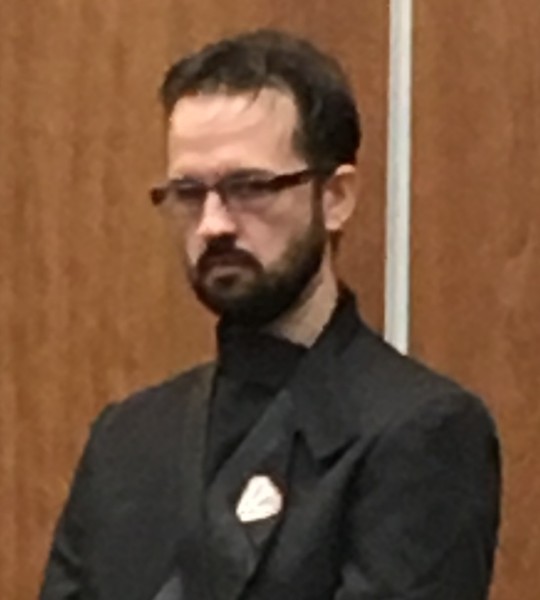
(This psycop lurked for the entire panel. It’s as perfectly creepy and wonderful as it sounds. When I mentioned that on twitter, it devolved in to a Babylon 5 pun war...)
When I came out of the B5 panel, the one person I’d seen with a brain slug had become a collective. And they continued to grow in number throughout Sunday. Props to the person who spent an entire year making brain slugs to give away to strangers at Nine Worlds.
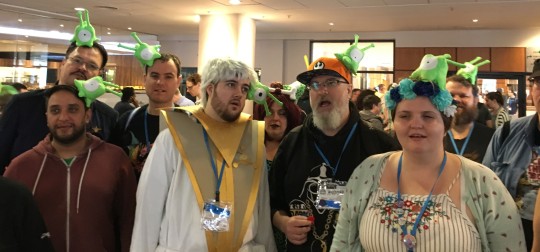
(The frightening brain slug collective. They continued to multiply throughout the day. Possibly the creepiest cosplay of the weekend, just because they continued to multiply.)
History’s Hidden Heroes III
Following two years of back-to-back success, the ‘History's Hidden Heroes’ session returns to its original format of ten to fifteen minute mini-talks by individual presenters discussing their favourite figures lost - or pushed aside - from mainstream history. Introduction by EK McAlpine, with talks from Tara, Avery, and Reiley.
This session was run by EK, and the speakers were Avery Delany, Tara Brown, and Reiley Daniels who all spoke about people in history who were part of the LGBTQ community, including some who were trans (though not remembered that way), some who were gender non-conforming, some who were openly queer at a time when that was (more) dangerous than now.
Avery spoke about trans masculine people in history, including a pioneering doctor, James Barry (note - while that Wiki article generally avoids using any pronouns at all, there is a source from the time quoted that misgenders Barry, so be careful if that would cause you any distress).
My favourite quote from Avery was “Do some queer history“, but I also really appreciated something I didn’t get the exact words of, but amounted to the idea that someone wouldn’t live as a gender different to the one they were assigned at birth for over 50 years if they did not actually identify as that gender. I really wish I’d got the actual words, because that quote stuck with me as much as anything.
Tara Brown spoke about three women of colour who were pioneers in blues and jazz - and sexuality, Ma Rainey, Bessie Smith, and Gladys Bentley.
One of the most interesting, and awful, takeaways from this talk was the brief discussion about how there is some difference in the historical record as to the sexuality women presented, and that this is due to McCarthyism which basically forced at least Gladys Bentley to present herself as no longer a lesbian. It made me so cross to think of a person as comfortable in their sexuality as Bentley having to forcibly change themselves because of the massive risks that being out and proud served in the backwards looking 1950s America.
Reiley spoke about a quack physician called Charles Hamilton (misgendered practically everywhere on the internet), and the importance of checking multiple sources and subjecting them to due scrutiny.
If anyone enjoyed this panel is interested in other hidden heroes from sources that aim at diversity in who and what they talk about (and use content notices), I highly recommend @missedinhistory, Sawbones, and @rejectedprincesses.
The Future of Nine Worlds
It's time for a chat about Nine Worlds and where it's going. If you have strong thoughts about what you'd like to see the event become, and would like to get involved in making things happen, this is your in-person opportunity to talk about the options and understand how we got where we are.
Went to this, and I honestly don’t have a lot to say about it - not a lot a could say about it because I’m very much not the right person to speak about what happened in the majority of the session.
I will say that the announcement that Nine Worlds was re-constituting after this year’s con felt like a blow to the gut.

(This was an incredibly powerful moment, and to know that even though the current director is stepping back a future nineworlds is possible meant so very much.)

(Main point by what may turn out to be the future team was that Nine Worlds is too precious to lose)
CN for discussion of police at con, and a failure act appropriately to the stated concerns of a con-goer (and more concerned people who did not speak about it at the Future of Nine Worlds panel). When this section is over there will be a delightful gif of Wonder Woman deflecting bullets so scroll below her if you will find this section challenging.
What happened next is best summed up by Alecto101 in this post which I urge you all to read (also please read this followup thread by the same person). Her recollection of what happened at that panel is extremely accurate. I was there, and that is what happened. It was not dealt with adequately by anyone there in an official capacity. Most people who wanted to say something in follow up raised the fact that Alecto101 had not had her question and concerns adequately addressed, and when the people on the stage did so, it was in an inappropriate way that put the emotional and intellectual workload back on the person who had rightly raised legitimate concerns.
I have absolutely no patience with the people who immediately strawmanned (Oh, you don’t want police there at all - you can’t exclude attendees based on job) - I was there and at no point did Alecto101 suggest that.
What I’m trying to say is something EK said much more eloquently: “Concerns about how police participate in 9W and the separation of their jobs and their everyday lives as fans are ABSOLUTELY valid and not the same as “ban cops”.“
The developments since have been a little more positive, and I’m hoping that the reconstitution can be used as a way to build in representation of PoC from the beginning rather than trying to add on later. The way 9W works for members of the LGBTQ or disabled communities needs to be the way it works for the BaME community too, or it is not diverse (I’ve paraphrased here. I’m pretty sure I’ve just mangled the original quote. I can’t remember who said it but it wasn’t originally me).
For followup, I recommend reading Avery Delany’s thread here and this thread on the official Nine Worlds twitter account. This web page from Nine Worlds is also very important reading. If you have the physical, emotional, and mental spoons to do so, please consider signing up to be part of the future.
Finally, if you’re thinking about writing to Alecto, please first consider this tweet from the official Nine Worlds Team: “We do not want people to interact with the blogger on our behalf. We do not need defending. We do not want them pursued again for conversations they don’t want to continue. Their opinions are valid and we are glad to have heard them. “ and just DON’T.

After that I had more con crash, and tried to manage it myself in the quiet room, before worrying that my nose blowing was going to upset those who had sensory overload and needed genuine quiet, and ran away to my room where E wrapped me in a blanket and fed me biscuits until I was human again. She is awesome and I’m totally in her debt. (Thread here of what I struggled with wrt the quiet room - I am not saying it should go away BTW - I don’t know what the right answer is, just that I found it challenging for my own particular issues)
The end of the con was then barrelling towards me at a terrifying speed. I went off site for food with some friends, and then we all formed half of a team for the unofficial “The Not The End of the Con Quiz” as team Last Best Hope for Victory, and we only went and bloody won! Massive props to @knittedace and @laalratty who basically carried our team through two rounds pretty much on their own (even though one of our team who shall remain nameless nearly submitted “Aragorn” as the name of the giant spider in Harry Potter, which was caught before we submitted for marking, but they shall not live it down... for a while anyway :))

(Team Last Best Hope for Victory. Actual quiz victors!)
Went to bed at midnight after several rounds of Slash, which was really the perfect end to a great con (even if I did keep crashing).

(Me on my way home. I look pretty knackered there, but it doesn’t even touch how completely mentally (and to some extent physically) exhausted I was, and still am. Completely worth it though.)
youtube
I may have listened to this on the journey home and sobbed. Like I said on my Friday post, it’s somehow become the song of the con for me.
#my stuff#babylon 5#brain slug collective#brain slugs#nine worlds#nineworlds#Future of Nine Worlds#representation#diversity
7 notes
·
View notes
Text
These sites are an inevitable outcome of the process by which we’ve outsourced knowledge to the third party of technology. This superficial democratization of erudition is not necessarily a bad thing, but it does mean you don’t have to have read Schopenhauer, or really anything much at all, to have access to just the right Schopenhauer quotation for your particular needs—and no grounds to suspect when the quotation you select has nothing to do with its ostensible source.
[...]
Because of the speed and abandon with which the Internet disseminates error, tracking the source of an online misattribution is usually a difficult business. It’s often the case in these situations that the true source of the quotation is unknown, and so it randomly attaches itself to some name-brand figure whose saying or writing such a thing seems vaguely plausible.
[...]
But the real villain here, as far as I’m concerned, is this vast quote-aggregation industrial complex that doth bestride the narrow online world like a colossus, to paraphrase … I don’t know, but let’s go with Shia Labeouf. These sites—your quotefreak.coms, your thinkexist.coms—cater to a growing appetite for filleted wisdom, for deboned wit, for the mechanically separated meat of literature. I myself use these quote aggregators more often than is probably wise to admit. As a reader, I’m constantly underlining things in books—sentences, passages, whole paragraphs and pages—as though the decisive act of taking a pencil from behind my ear and drawing an emphatic line beneath a particularly fine phrase will somehow imprint that phrase in my memory. It doesn’t, of course. Within a week, I’ll have only the faintest recollection of the phrase. And so I’ll find myself googling “schopenhauer pendulum boredom” or whatever, and I’ll wind up on BrainyQuote trying to separate the pessimism from the Peanuts.
[...]
There’s a figurative and literal removal of knowledge going on here that somehow reflects the basic enterprise of BrainyQuote, along with its countless clones and rivals. (Rivals which, according to the above-mentioned About Us page, are to be rigorously avoided, unless you want to literally turn yourself stupid: “Recent studies show time spent on copycat quotation sites leads to a loss of IQ points.”) The whole thing, in other words, seems like a subversive parody of the way in which the Internet has disrupted the erudition vertical from Wikipedia to Brain Pickings to the ascent of explainer-based journalism. But that, as Schopenhauer himself famously put it, is just the way the cookie crumbles.
1 note
·
View note
Text
May 25, 2020
Orchestrators of Attention

Hayati Evreni’s Persistence of Covid
I typically have a very vivid dream life. Whole evenings of movies with characters I’ve never met and settings I’ve never seen. It’s one of the reasons I so love to sleep. Every night, I have an imagined altered reality to look forward to. And most mornings, to keep the stimuli of these vistiations fresh, I regale Geoff with a detailed recollection of these colorful fictions. But last night my reverie was disturbingly similar to my waking life. Zoom calls with real music students that I’ve been teaching. The delivery of our commissioned fence mural, which is actually scheduled for this Wednesday. It’s like so much else during this period, where everything seems to be bleeding into each other. Days to Weeks. Work to Home. And now, even the treasured boundary between my subconscious and conscious life has been compromised.
The fluid nature of perceived time in our current reality is problematic in so many ways. We are animals who’ve found real comfort from the compartmentilization of our lives. Separate spaces for every endeavor, from offices to gyms to libraries. We mark time in dozens of essential ways, with calendars, outfit changes, meal routines, holiday celebrations, happy hours - most all of which have dramatically changed during Covid. This weekend, I read the best explanation for why we find the circular time that has been foisted on us so difficult. Man Booker International Winner, Olga Tokarczuk’s Flights is part travel-fiction, part-memoir. Each vignette is a musing about the human propensity to wander. Here, she explains why perhaps only those of us truly tied to natural cycles, like growing seasons, can thrive in circumstances like we face today.
Sedentary people prefer the pleasure of circular time, in which every object and event must return to its own beginning, curl back up into an embryo and repeat the process of maturation and death. But nomads and merchants, as they set off on journeys, had to think up a different type of time for themselves, one that would better respond to the needs of their travels. That time is linear time, more practical because it was able to measure progress towards a goal or destination, rise in percentages. Every moment is unique; no moment can ever be repeated. This idea favors risk-taking, living life to the fullest, seizing the day. And yet the innovation is a profoundly bitter one: when change over time is irreversible, loss and mourning become daily things.
So, given that most people in modern society are far more aligned with the nomad/merchant class, it makes sense that we are sentenced to this inevitable grief once our “Just Do It”, “Follow Your Bliss” plans get derailed off-course. This analysis does not provide any solutions. However, I do think it absolves us of a certain culpability, so that we can stop blaming ourselves for feeling bad or for not handling the new norm as well as we should. Meanwhile, I think it can still be helpful to look for coping mechanisms, and I’ve found some from Jenny Odell, the unintended Queen of Quarantine who I crowned such after the cogent messages from her 2019 book, How To Do Nothing, came to be the perfect precepts for our time.
An avid bird-watcher, walker and observer, Odell is a proponent of slowing down to make space to notice. She calls her book a “field guide to doing nothing as an act of political resistance to the attention economy.” Her suggestions serve as antidotes to the distracting and fractured nature of attention that the limitless connectivity of our plugged-in lives demands. So, while most of us are still highly connected online, there are so many other ways in which we’ve become uplugged from life as we knew it. And I think she is suggesting that, perhaps, instead of seeing this as disconnection, or as an untethering, we can appreciate the space that this is creating for us to develop subtler forms of attention.
Odell describes herself, and all artists, as “orchestrators of attention”. She sees artists as curators of objects and ideas, re-imagined in ways that allow us to see things differently. I certainly turn to artists and writers to help me do this. And ironically, it is a circular journey of a different sort that brought me to her wisdom in the first place. Lately, I’ve found myself in a strange intellectual fractal. A quest for philosophical nuggets that has me spinning inside a loop of similar thinkers.
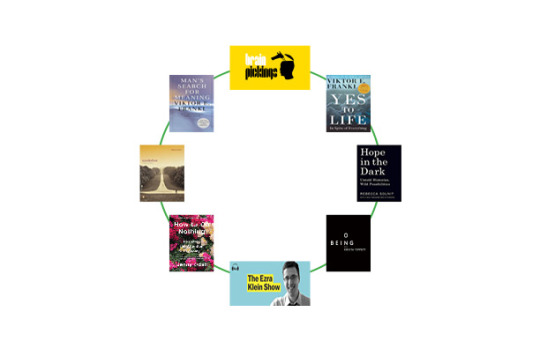
I regulary subscribe to BrainPickings, the source of many such nuggets. And that’s where I found Victor Frankl’s Yes to Life quote (from March 28 in this blog) about “the power to choose our response”. That newsletter also quoted Rebecca Solnit (Hope in the Dark), who I checked out further on Krista Tippet’s podcast, On Being. Looking at older episodes of this show, I found an interview with Ezra Klein (Why We’re Polarized), whose podcast just featured Jenny Odell on May 8th: On Nature, Art, and Burnout in Quarantine. https://www.vox.com/podcasts/2020/5/8/21252074/jenny-odell-the-ezra-klein-show-how-to-do-nothing-coronavirus-covid-19 This inspired me to purchase her new book, with its page 9 quote of none-other-than Solnit, again, this time from her book, Paradise Built in Hell. Back down the Solnit rabbit hole, I found another Frankl reference in this book, now from Man’s Search for Meaning. And so, the perfect circle was complete.
May 26, 2020
Unproductivity

Labyrinth project by Emily Carr university mentor, Kitty Bland, and student, Mary Rusk - https://www.ecuad.ca/news/2020/kitty-blandy-and-mary-rusak-find-focus-during-pandemic-with-meditation-pathway
Circular time makes me think of labyrinths. Mandalas of pathways that lead to nowhere, whose hypnotic ellipses draw our single-pointed focus towards the simple act of walking. I have always loved these places of reflection. And I find it erroneous that the term labyrinthian has come to refer to complicated places where we get lost. Because I feel that I actually find myself in such places. The only thing lost is a false sense of destination as the purpose in life.
Odell subscribes to a similar viewpoint in How to Do Nothing. Rather than a plea to escape reality, quit our jobs, or shrug our responsibilities, her book is an invitation to question what we perceive as productive. I think our current reality has many of us doing this. My morning walk has me literally “stopping and smelling the roses” each day, as I’ve seen so many others do during this altered time.
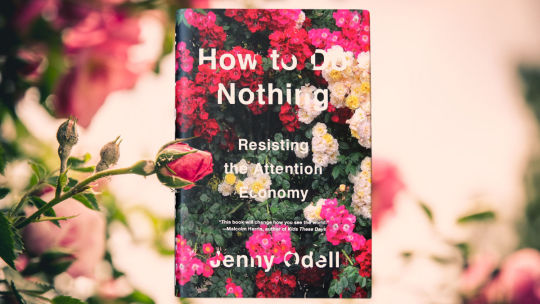
So, while it has encouraged me to see normally overprogrammed-teens watching sunsets and families chilling for endless hours on front lawns, I have also observed a pattern of apology amongst my peers, when they acknowledge having been “less-productive than usual”, during this period. So, I’ve taken to meet this only with permission. This is something I’ve increasingly given myself ever since my excessive drive, as a flutist, left me with a chronic overuse injury that was a wake-up call I’ve only recently been able to truly appreciate.
After this major uninvited “halting” of my career, I became acutely aware of how often people answer “How are you?” with “Busy.” Particularly artists, who have perhaps been undercompensated, underemployed and underappreciated for so long, it feels like being “busy” is a badge of honor that implies their work is in-demand. So, I get it. But still, I have made a point, since this realization, never to answer that question as such. Busy is not an emotion. The truth behind the word - feelings of anxiety, overwhelm and fear - are perhaps too telling to reveal. Because admitting them might mean we have to shift something. They might force us to slow down and stop busying ourselves, which is maybe the scariest thing of all. Because then, we have to face who we truly are when we are not “doing”.
To track my own “doing” during quarantine, I’ve been particularly careful about limiting my screen time. So, I check it weekly. But it was only this week that I finally went to the second page of the iPhone screen time data, where I found a strange categorization of time. It breaks it down into Productive, Creative, Social, Entertainment, Reading and Educational use. However, what they place in each category runs quite counter to what happens to be true for me now. Photos are listed as a Creative pursuit, however many of my hours have been frittered away deleting unnecessary shots (attempts to capture moments that might have been more mindfully spent camera-free). So, this endeavor doesn’t feel that creative to me. Whats App is marked as Social but, of course, it’s now become the arena for some of my most my productive work, since I’m using it as a teaching tool. And Notes is in the Productive category, even though, as a self-admitted list-addict, my worst time-waster is making and remaking these itemized scrolls intended to render me more efficient, when I can’t even imagine how much “productive” time I must have lost just writing them.
So, we all have something to learn from this clever street artist, whose balloon art gives us an important reminder.

May 27, 2020
Covid Art Museum

So far my “efforts” to do nothing more (as ironic as that sounds) have gone swimmingly. I deliberately cancelled one of my Zoom calls this week, two other meetings conveniently got cancelled for me, and I was left with many more hours to spend spontaneously. Some of these involved lying in the grass eating gelato. Others watching passerbys from my front stoop. And one I spent biking the new “slow street” circuit in Vancouver, which has been designated a car-free zone to create more safe, physically-distant space for cyclists and pedestrains to roam. That even our roadways are now on a diet from their usual busyness, seems to me a beautiful metaphor.
Of course, some of this time also involved digital daydreaming, as I prefer to romantically call surfing the web. But using the intentional lens of seeking artistic responses to share on this blog makes even this indulgence feel more guilt-free. So, this week, it landed me on a very cool Instagram page, full of visual reflections about this time (digital illustrations, photographs, sketches, watercolors and more). In fact, it’s where I stumbled upon the balloon art, above, which evolved into my entire week of blog entries. Quite a few pieces reference circular time in some way (above). And a remarkable number of them depict doing nothing (below). Jenny Odell is clearly on to something...
https://www.instagram.com/covidartmuseum/?hl=en

May 28, 2020
Hidden Symphonies

Udo Noll, a Berlin-based media artist and founder of Radio Aporee, a digital global sound map, documented before and during the pandemic
The music of my environment has always captivated me. In fact, I dedicate almost an entire chapter of my novel to birdsong. I love the voice memo feature on my phone, which I use like an auditory camera, as I travel. I’ve learned that this is not a habit many people share. Until recently, that is. Because it seems that suddenly, we are all beginning to listen more. Now, with less traffic, quieter commercial corridors, and other colluding factors, there is left an amazing amplification of the soundscapes which always existed behind the din.
Before Covid, a long tradition of deep listening has been cultivated by various sound artists. American composer, Pauline Oliveros founded the Deep Listening Institute in 1985 (originally called the Pauline Olveros Foundation). Here, she invited musicians to improvise and record, in particularly resonant and reverberant spaces like caves, to inspire extra-sensitive responsiveness.
In the 70’s, Canadian composers, Hildegard Westercamp and Murray Shafer, started the World Soundscape Project (https://www.sfu.ca/~truax/wsp.html), which recorded Vancouver’s sonic landscape to illustrate the negative effects of noise pollution, ultimately resulting in more positive guidelines for urban acoustical design.
Acoustic ecologist, Gordon Hempton says that silence is not the absence of sound, but rather the presence of everything. In the short documentary, Sanctuaries of Silence, he offers tools for seeking silence amidst noisy urban life.https://www.youtube.com/watch?v=qUxMdYhipvQ
But his suggestions probably never could have predicted Covid, which has achieved this result with alarming swiftness. British sound artist and field recordist, Stuart Fowkes has been tracking the soundscapes of this disquieting time on his website, Cities and Memory. https://citiesandmemory.com/covid19-sounds/
Here, you can click on one of 3,000+ global coordinates and listen to everything from empty flagpoles, and ticking radiators, to kites flying. Anyone is welcome to contribute, using #stayhomesounds. And this is my own addition to the catalogue:

Bullfrogs mating: https://youtu.be/ZoKT-RlDfs8
The New York Times, has tracked the music of the pandemic in another interesting way. Measuring by decibels (below), they compare the soundscape of a normally busy Manhattan street, before and during quarantine. https://www.nytimes.com/interactive/2020/05/22/upshot/coronavirus-quiet-city-noise.html
Pre-covid nights sound more like quarantine days, averaging around 64 decibels.
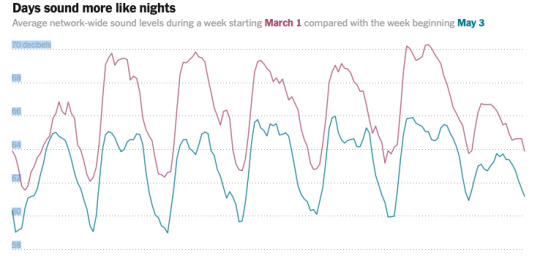
Another bi-product of the pandemic is a trend towards birdwatching. The world’s attention was brought to birding this week, due to an unfortunate racist incident that occurred in New York’s Central Park. Christian Cooper was drawn to the park because of the orioles and yellow warblers he could find there. While birding, he politely asked a woman if she would kindly put her dog on a leash. When she refused, he insited and she proceeded to call the cops. Cooper was armed with little more than binoculars and a camera. But apparently, his crime was being black. The woman was white. Luckily, he caught her ridiculous cry for help (“I’m being threatened by an African-American man.”) on camera. The video immediately went viral and resulted in her being fired from her job. Graciously, he remarked today in the Times, that this punishment did not fit her crime, and while he wants to hold her to account for her racist behavior, he doesn’t believe that “her life needs to be torn apart.”
Whatever her fate, if this time inspires deeper listening for you, let’s hope your soundscape walks are far less eventful than his was.
May 29, 2020
Covid Shuffle
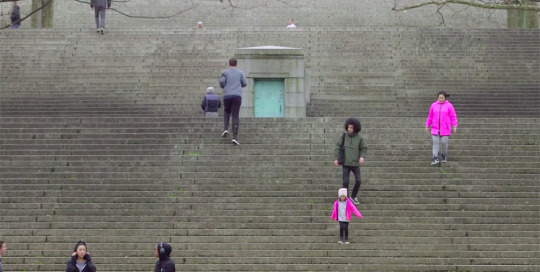
Brooklyn’s usually bustling Fort Greene Park, during the pandemic
From the beginning of social distancing, I have been quite fascinated by the complicated choreography we are collectively participating in. I would give anything to be an eagle, looking down from above, just to witness the maze of interwoven patterns that our sidewalk dances create. And I am not the only person interested in this do-si-do.
If you search “six feet apart” on YouTube, you can’t imagine how many musicians, famous or otherwise, have composed new songs with this exact title (IE. country singer, Luke Combs, teen pop star, Alec Benjamin). It’s just one of many things that illustrate the uncanny global resonance that is happening right now, even while there are still vast differences between the ways people experience this pandemic.
Personally, I’m partial to this rap, written as a PSA for UNC Health, by The Holderness Family, a modern-day Al Yankovich-style parody band comprised of former FOX sportscaster, Penn Holderness with his wife and kids. https://m.youtube.com/watch?v=XjfCeY4D2QI
Deeper into this search, I found another music video, by a different family band in LA, called Haim. These three Grammy-nominated sisters have written the song, I Know Alone to express how quarantine living has felt for them. Meanwhile, they appropriately dance to their lyrics six feet apart.
https://www.google.ca/amp/s/www.vulture.com/amp/2020/04/haim-i-know-alone-video-album-release-date.html

In the dance world, old colleagues of mine, from Flagstaff, Arizona, will host a virtual Festival that starts this Friday, May 29th, featuring original socially-distant choreography from movers all over the Southwest. Fittingly, it’s called the Six Feet Apart Dance Festival.
https://canyonmovementcompany.org/cmc/upcoming-events/

Documenting the Covid shuffle in a very different way, Toronto geographer, Daniel Rotszdain created a “social distancing machine” to demonstrate just how difficult a genuine 6-foot radius is to maintain in public space.

And finally, this hip hop dance compilation, made in 2019, could be the anthem for our times.
MC Hammer’s Can’t Touch This - https://www.youtube.com/watch?v=PJskIJGEsd8
0 notes
Text
BBLL fanfiction pt. 2 - A sorrowful return to Yokosuka
Behold my first attempt to write really angsty shit about the aftermath of verse Bloodline Revolution. I think it went really well, given that I had to hold back tears during writing it. It’s also ten times as long than my last one O.o However I still suck at writing synopsis, oh well I’ll get better the more I write
To quote my trademark phrase I use a lot: I never knew I had... such angst inside. (If you know the Original Source, kudos to you! ;) )
A sorrowful return to Yokosuka
Words: 2058
Synopsis: It has been a month after Yu and Yuseph’s final fateful battle. After almost drowning to paperwork and getting help from Shadow Operatives, Naoto returns to the place where it all started – Yokosuka – to recollect herself and face the facts. She decides to visit her friend who suffered too much (and didn’t deserve this pain) after a while to give this trip a meaning and maybe to show she can try to help her as well.
Naoto stepped out of the small train station. She had returned the town of Yokosuka, which had been the core foundation of Joseph Equita’s plans. Her superior, Mitsuru-san had persuaded Naoto to go there for personal reasons: She had mourned for the outcome of the last battle after Yuseph’s trial for weeks and tried to get over it by several ways such as thinking something else, overworking her ass off or letting Akihiko-san and Mitsuru-san hear her worries whenever she had trouble falling asleep. After the long mental preparation and the time that had passed, she felt like she was ready to face it all - even though it still had required her superior to give her a day off, buy her an one-way ticket and escort her to the station. “Just leave the paperwork for tomorrow, Shirogane-san, and go to Yokosuka. Trust me, you are going to thank me later,”, had been her words.
She passed by the HQ of Counter-Demon Force and noted the atmosphere building hadn’t changed at all. She didn’t give a tiniest glance at it: It only brought bad memories and sadness of the fate of CDF and how the current mood was going to last for a long time. She held back the emotions as as she ran fast past it and to the save haven she knew and treasured: the apartment of Trucy Wright and Yu Narukami. She had been living alone since Yu had fallen into a coma state and she was probably the first visitor she had for weeks. Like others, she had been crushed by the news and got so depressed she took at least a long-lasting hiatus from her magician career.
She knocked on the door nervously to see a familiar face with a surprised expression. She clearly hadn’t expected any visitors soon. “Hello there Trucy-san… It has been too long.” She hadn’t been here for three weeks just because the memories were too painful and bittersweet. She could still see her senpai showing his sweetheart his newest magic trick he’d practiced from the book and Trucy smiling back and hugging him as a way of saying “You’re the greatest magician I know and I love you for it.”.
“Yeah… It has. I’m glad you are here now though!” Trucy was smiling at her, looking delighted to see her favorite detective friend. Naoto knew it was a facade to cover her sadness and the sting in her heart. She couldn’t blame her for it: Losing Yu had been the hardest for her. She had taken a long hiatus and felt extremely depressed after all.
“May I come in?” She asked politely and Trucy ushered her to already come inside since she must be cold already from all the walking and running around. “Sorry I don’t have anything prepared right now,” Trucy apologized.
“It’s fine, I didn’t expect anything for my surprise visit. Do you mind me asking for a… hug?” She asked carefully. Trucy and Yu hugs were really comforting and worked for every kind of problem she had and she really needed comfort right now.
“Of course, Naoto-chan! We all need a hug sometimes,”, Trucy said and hugged her tightly. Naoto hugged her back and stared at the wall with a blank gaze. She thanked her friend and revealed the most distressing thought she had.
“Thank you, Trucy-san… recent weeks have been hard for me. I just wish everything was a bad dream we could wake up from…” She muttered out quietly. The event still haunted her even though it happened only a few weeks ago and all people that had taken part in it had been mentally and possibly physically scarred. All of them had dealt with the stress differently and been by themselves to think about priorities in her life. If you didn’t count the Inaba residents talking about what happened in their small groups, they had been isolated and changed irreversibly due to their difficulties of accepting the new reality.
Chie had taken up kickboxing right after the incident to take her mind off things and was almost married to the gym. Likewise, the workaholics of the team had used loads of time to their tasks: Yukiko-san had started to work longer hours at the Inn, Yosuke was taking extra swifts at Junes with Teddie as often as he could and Rise had gone full speed on making new records and holding performances. Kanji-san had been knitting and sewing more cute soft animals 24/7 at her grandmother’s place and had sadly ended up picking fights at alleys with other delinquents and punks like he had done before joining IT. They were all coping mechanisms to recover from the tragedy.
Naoto didn’t have the opportunity to do the same as the workaholics of IT because she was already working her hardest and her… weakened condition stopped her from putting any more effort. Instead, she had seeked guidance from Shadow Operatives and gotten the help she needed. In addition to a distraction from the incident the paperwork and schoolwork offered her, organized talking sessions and cheerful words from her teammates, she had gotten advice from Akihiko-san and Mitsuru-san, her parent figures.
According to them her temporary solution wasn’t to try looking for ways to distract or distance yourself from the past tragedies. They knew from experience that it never worked long-term because eventually you’d have to face the facts. It was the hardest and most painful way but in the end it was easier for everyone, including yourself. It was one of the reasons she had ended up visiting Yokosuka: She wanted to face the harsh reality they were in right now and come to terms with it. Only after that she could move on in her life and continue living as normal as possible.
The words Naoto said the facade Trucy was trying to hold shattered and she started crying almost immediately and bemoaning the situation she was in. “It’s not fair, Naoto-chan! Why did it have to be him who suffered the most?! He was everything I had and now I have nothing!” Trucy had now broken down and she was sobbing to Naoto’s shoulder. It pained Naoto to see the always cheerful girl so down and broken and she kept hugging her. “Why, Naoto-chan, why?!”
“I don’t know, Trucy-san… I truly don’t know. If I had known what would happen I would have stopped it and given Yuseph-san and Yu-senpai a better future.” Naoto sounded sad and disappointed in herself. She had known the risks of overusing your skills and energy existed and how it could cause a coma-like state but she could never have thought it had gone this far.
“I know you’d done that, Naoto-chan. Your caring and loyalty knows no boundaries.” For a bit, Trucy sounded more neutral, but soon after she started screaming on how unfair it was. “I just want to know why God is against our happiness and wants to ruin everything we had. Why?”
“If we only could ask him that. I’d like to know the same too.” Naoto didn’t want let her friend go or leave her alone with her emotions: They were too strong to deal with alone. She had been able to survive this month with the support of Shadow Operatives, her second family and she owed her life and happiness to them. She wanted everyone to have an angel like that in their lives.
“I want you to know that… I’m here for you no matter what. I won’t die off that easily and I will be by your side to support you.” She promised to her that she can call her anytime she feels sad or lonely and she would do her best to help her. Trucy had cheered her on when she’d been in trouble or had problems in her life so she’s do the same for her now. She deserved it more than anyone.
“Thank you Naoto-chan…” She sniffled when she heard her suggestion on supporting her in hard times. “I’m so glad you’re here now… Nobody has visited me in three weeks and I had been worried sick everyone had forgotten about me.”
Naoto looked sadly at Trucy: She must have felt the distance others took as excruciating and hurtful. She had the urge to comfort her and tell her the ideas she had were total lies and followed her heart. “Believe me when I say this, Trucy-san: Nobody forgot about you or intentionally avoided being in contact. I’m sure the others were as broken as all people involved were and they simply tried to get over it by distancing themselves from everything. But… Their way of acting isn’t the best possible. Eventually you have to face the truth and see things as they are… As Yu-senpai used to say.” She stared crying more after saying the last sentence as she remembered her senpai’s last smile again. Soon after she was bawling with Trucy.
“Why, Yu-senpai…? Why did you have to take the bullet for all of us?” She said out loud and kept on crying until her energy had run out. She looked at Trucy: She was also worn out from pouring her feelings out. She squeezed her for the last time and retracted her arms away from Trucy’s sides.
“Do you want to stay the night?” Trucy asked her, still drying her tears with the napkin she took from her sleeve. “It’s really late and all trains have already left.” She took another one and gave it to Naoto.
“I’d love to, Trucy-san. Let us set the futon to your room, I don’t want to sleep alone tonight.” She accepted the napkin she received from her young magician friend and wiped her tears off. She knew neither of them was going to get a good night’s sleep if they slept in separate rooms.
“Me neither, Naoto-chan…”
*****
After the night routines Naoto and Trucy were both at their respective futons laying side by side. They gazed at the night sky and after some minutes of silence, Trucy thanked Naoto for everything today. “Thank you, Naoto-chan, for coming today and listening to my breakdown. I don’t know what I could’ve done without you.”
“You’re more than welcome, Trucy-san. We both needed this… Release of bent-up sorrow.” Naoto thought it might be good for both of them to just try to fall asleep. “I’m going to try sleeping now and I... suggest you do the same. It’d be good for us to get some sleep. Good night, Trucy-san. Don’t hesitate to wake me up if you want or need something.”
Trucy nodded without saying a word and started to try sleeping. She fell asleep within minutes. Naoto smiled at the sight and mused overall about the overall events of this day.
‘It was definitely worth it to come here.’ She thought when she was laying inside the futon in the darkness of Trucy’s room. 'I could help Trucy-san overcome some of the demons in her life and somehow… I feel relieved. I’m not as anxious as I was earlier.’ It still hurt in her heart but the pain had dulled a bit. Akihiko had been right: confiding to someone you trust and know who had been through similar times really worked.
Now, finally, she could start her healing process for real. Maybe Trucy could do so soon in the near future but she didn’t think of expecting her to heal from the sorrow as fast as she could. It would take longer for her to recover since she had let the burden fall off her shoulders today. But maybe… It was OK. There was no time limit or schedule for getting over the losing of your beloved one.
Everything wouldn’t be exactly the same but if the members of S.E.E.S. had managed to get over Minato Arisato’s death, they would be capable of doing so as well. Maybe someday Yokosuka would be just an ordinary town shrouded with a fateful encounter and an eventful past and Yamaoka a town without any negative vibes.
#bizarre bloodline#bbll#bbll fanfiction#bbll fanfic#bizarre bloodline fanfiction#bizarre bloodline fanfic#naoto shirogane#trucy wright#minuki naruhodou#smt#smt x aa#ace attorney#persona x aa#choo choo angst train coming#well here's the first angst fic i promised
1 note
·
View note
Link

Becuase, books… Photo by Thought Catalog on Unsplash
12 months ago I summarised 30 insights from the 30 books I’d read in 2017 (here and here).
This year I have a better word than insights: noodles.
I also have 40 books under my belt, so strap yourselves in for a two-part post.
With a commitment to more fiction and variety (thanks mum) I present the first half of said list, accompanied by an ‘in a gif’ summary for those who enjoy a visual:
1. Deep Work — Cal Newport
Will change the way you think about structuring work days. Deep Work steps through the inefficient truths of most peoples relationship to work, what it means to do real, deep, uninterrupted work and why it matters.
Noodle: Put away your phone and go deep.
It’s easy to get caught up in the ‘shallow work’ of responding to emails and notifications and trick ourselves into thinking we’re being productive. The good stuff lies on the other side of uninterrupted blocks of deep work, ala A Beautiful Mind.
In a gif:
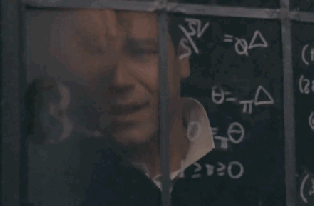
2. The Girl Who Takes an Eye for an Eye — David Lagercrantz
Got a dose of fiction early in the year with the latest continuation of the Millenium trilogy. While no longer written by Stieg Larsson, I still found it to be an engaging and sometimes thrilling read.
Noodle: Lisbeth Salander is still a badass that makes me want to get really good at coding and hacking.
In a gif:

3. Tribe of Mentors — Tim Ferriss
The latest Tim Ferriss book where he asked the same 11 questions to over 100 of the world’s elite (in their respective fields). It’s repetitive, huge and best consumed in small chunks.
Noodle: It’s never been easier to learn from the best, even if you can’t speak to them directly. I wrote this separate post about this book earlier in the year.
In a gif:
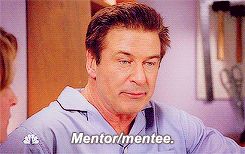
4. Radical Self Acceptance — Tara Brach
An audiobook that goes deep into meditation and our relationship with ourselves.
Noodle: I mean, this quote says it best:
��Perhaps the biggest tragedy of our lives is that freedom is possible, yet we can pass our years trapped in the same old patterns… each day we listen to inner voices that keep our life small.”
In a gif:

5. The War of Art — Steven Pressfield
A reread as I began to re-wrestle with how to best work creatively and dance with the constant voice of doubt, which Pressfield calls, ‘the resistance’.
Noodle: Creative work is a constant dance with fear.
“The more scared we are of the work… the more we have to do it.”
In a gif:
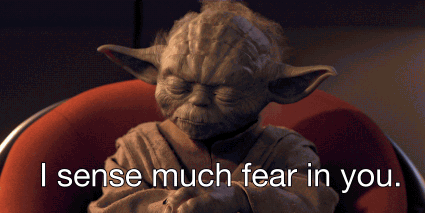
6. Footprints on the Moon — Seth Godin
No link because, well, this was a gift from Seth and isn’t available for sale publically.
Noodle: Changemakers understand these three things: a) creative people change the world,
b) you can’t change everyone, hence the importance of the question ‘who’s it for?’ and;
c) you must add intention to everything, therefore ask ‘what’s it for?’
In a gif:

7. How to Walk — Thic Nhat Hanh
A tiny book that focusses on walking mindfully.
Fun fact: Ironically I read this around the time I had hip surgery and was forced to teach myself to walk again.
Noodle: Most of the time we’re walking we are distracted in thought and forget to think about the act itself. What would it look like to bring attention to each step we take?
“Forgetfulness is the opposite of mindfulness.”
In a gif:

8. The Little Prince — Antoine de Saint-Exupéry
A children’s book that I’m sure I read as a kid but had almost no recollection of (much to the shock of my girlfriend).
She gave me a classic case of “I’m not angry, just disappointed” so I had no choice but to read it. Two hours later on a lazy Sunday afternoon, I turned back to the front and read it again.
Noodle: Another I was compelled to write an entire post about earlier in the year.
In a gif:
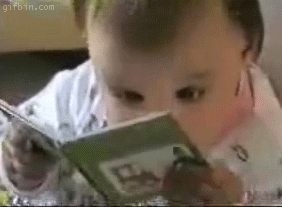
9. Four Hour Work Week — Tim Ferriss
A reread to remind myself how I might be more effective and efficient with my time.
Noodle: I was reminded of this gem and its relevance to Deep Work:
“Are you inventing work to avoid the important?” which I also translate to: “Where are you hiding?”
In a gif:

10. Little Book of Hygge — Meik Wiking
A book that single-handedly opened my eyes to the simple joy of having candles.
I still have no idea how to pronounce or explain the Danish phrase, Hygge. It’s best thought of as a feeling, according to this book. The kind of feeling that comes from sipping a hot coffee on a freezing winters day when you’re inside by the fire.
Noodle: The Danish know what’s up. Small things like nice lighting, warmth, candles and living minimally are some of the most important contributing factors to our happiness.
In a gif:

11. It Happens to Strong People Too — Kaci Kai
I’m lucky enough to call Kaci a friend and her short collection of poems is everything.
Take it from someone who previously didn’t “get” poetry all that well, no matter who you are there is at least one poem among this collection that will get you right between the eyes.
Noodle: The title says it all. Everyone has their thing. Their battle, their struggle, that voice in their head. The more we realise and share this, the more connected we all become.
In a gif:

12. Jonathan Livingston Seagull — Richard Bach
A friend’s answer to the question “do you know any more books like The Little Prince?”
Noodle: The main character (yes, it’s a seagull) realises that his tenacity and desire to learn make him “pretty well a one-in-a-million bird.”
I loved this as a reminder to always be curious and seek to learn more.
In a gif:

13. The Coaching Habit — Michael Bungay Stanier
A reread of a book I read last year about asking great questions.
Noodle: “What’s on your mind?” coupled with “And what else?” are questions we don’t ask each other enough.
In a gif:
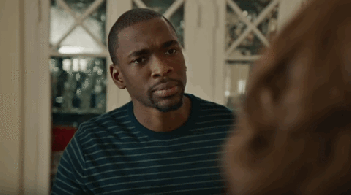
14. The Prosperous Coach — Steve Chandler and Rich Livin
Terrible title but a super insightful book. It will help you think about coaching, relationships and business in a way you might not have before.
Noodle: There is no right way to run a business, be a leader or a coach… Only your way.
In a gif:
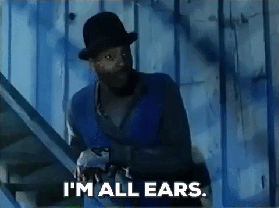
15. The Art of Possibility — Rosamund and Benjamin Zander
Another reread, this time because last year I said some parts were lost on me. Not this time, though. It’s firmly become one of my favourite books on creativity and if you haven’t already, just read this book.
Noodle: When learning, the way we respond to ‘mistakes’ or ‘failures’ is everything. The Zanders introduce this elegant idea for responding to our mistakes with the simple phrase: “how fascinating.”
In a gif:

16. Nine Stories — JD Salinger
Fiction? Check. Great author? Check. How could this series of short stories not be good? Sadly, I won’t lie, I was a little disappointed. Maybe it was me and my state of mind at the time, but I struggled to keep up, relate to or connect with any of the nine stories.
Noodle: Not all books are for everyone.
In a gif:

17. Designing Your Life — Bill Burnett
A very actionable and useful book based on a popular class of the same name at Stanford University.
Noodle: What would it look like to apply design thinking to your life? To get proactive, rather than reactive?
In a gif:

18. Reach Out — Molly Beck
An easy, actionable read on how to generously start conversations with those that inspire you. Generously being the operative word.
Noodle: It mean, it’s obvious, but if we took time to generously reach out to 1 new person every day for a year, we’d have up to 365 connections we wouldn’t have otherwise had.
In a gif:
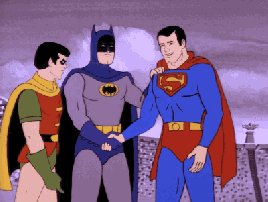
19. Purple Cow — Seth Godin
I know, I know, yet another Seth book, and yet another reread. Alas, I planned to read intentionally this year and Purple Cow came just as I was reconsidering my website.
Noodle: Stand out and make your business, product or service something people remark at, just like a purple cow… Or in the case of the gif, a cow with luscious locks.
In a gif:

20. Story Driven — Bernadette Jiwa
A brilliant little book on how to use stories as a strategy for communicating your business.
Noodle: What if paused to consider the stories that got us to where we are? Could they help us better connect with current and future clients?
In a gif:
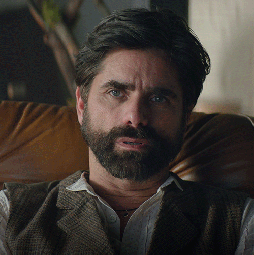
Next week I’ll tackle 21–40, in the meantime Happy Holidays you amazing humans.
Thanks for reading and being you. It means a lot to me.
Note: If you’re enjoying A bird’s eye view and all of its noodle-y goodness tell a friend they can subscribe here too.
Originally published at abev.blog.
20 noodles from 20 books was originally published in It's Your Turn on Medium, where people are continuing the conversation by highlighting and responding to this story.
by Peter Shepherd via It's Your Turn - Medium #itsyourturn #altMBA #SethGodin #quotes #inspiration #stories #change #transformation #writers #writing #self #shipping #personaldevelopment #growth #education #marketing #entrepreneurship #leadership #personaldev #wellness #medium #blogging #quoteoftheday #inspirationoftheday
#ItsYourTurn#It's Your Turn#IYT#altMBA#Seth Godin#Inspiration#Stories#Change#Transformation#Blog#Medi
0 notes